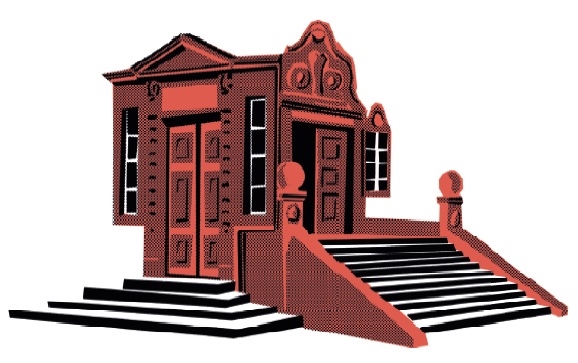 On 11 July 2022, the Interdepartmental Committee of the History of Science and Technology of the Hungarian Academy of Sciences organised a conference on The Jena–Weimar Constellation and its Impact on Hungary. Two of our colleagues participated in the conference: Piroska Balogh presented a paper on Eighteenth- and Nineteenth-Century Hungarian Dream Theories in German Context and Dezső Gurka spoke about Hungarian Mineralogists in Goethe’s Environment.
On 11 July 2022, the Interdepartmental Committee of the History of Science and Technology of the Hungarian Academy of Sciences organised a conference on The Jena–Weimar Constellation and its Impact on Hungary. Two of our colleagues participated in the conference: Piroska Balogh presented a paper on Eighteenth- and Nineteenth-Century Hungarian Dream Theories in German Context and Dezső Gurka spoke about Hungarian Mineralogists in Goethe’s Environment.
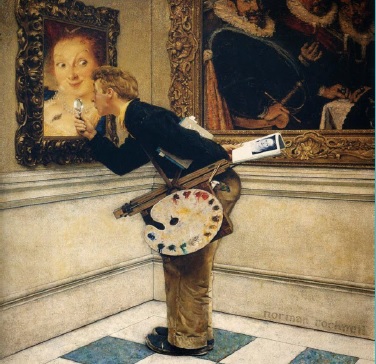 On 11–12 March 2022, the Critical Studies Research Group of the Hungarian Academy of Sciences and the University of Pécs and the Department of Modern and Contemporary Philosophy of Eötvös Loránd University organised a conference on the Shapes of Criticism. Our colleague, Dezső Gurka participated in the online event and presented a paper on Schelling and Hegel’s Diverging Concepts of Criticism in the Articles of the Kritisches Journal der Philosophie.
On 11–12 March 2022, the Critical Studies Research Group of the Hungarian Academy of Sciences and the University of Pécs and the Department of Modern and Contemporary Philosophy of Eötvös Loránd University organised a conference on the Shapes of Criticism. Our colleague, Dezső Gurka participated in the online event and presented a paper on Schelling and Hegel’s Diverging Concepts of Criticism in the Articles of the Kritisches Journal der Philosophie.
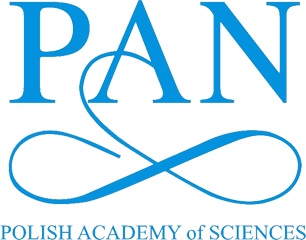 On 8 October 2021, the Institutes for the History of Sciences and Literary Studies of the Polish Academy of Sciences organised a bilingual (Polish and English) online seminar on the Sciences and Humanities in the Service of Politics in Enlightenment Europe, where our colleague, Tibor Bodnár-Király gave a presentation on Political Science in the Service of Public Happiness: Joseph von Reviczky (1750–1815) and the Good Administration.
On 8 October 2021, the Institutes for the History of Sciences and Literary Studies of the Polish Academy of Sciences organised a bilingual (Polish and English) online seminar on the Sciences and Humanities in the Service of Politics in Enlightenment Europe, where our colleague, Tibor Bodnár-Király gave a presentation on Political Science in the Service of Public Happiness: Joseph von Reviczky (1750–1815) and the Good Administration.
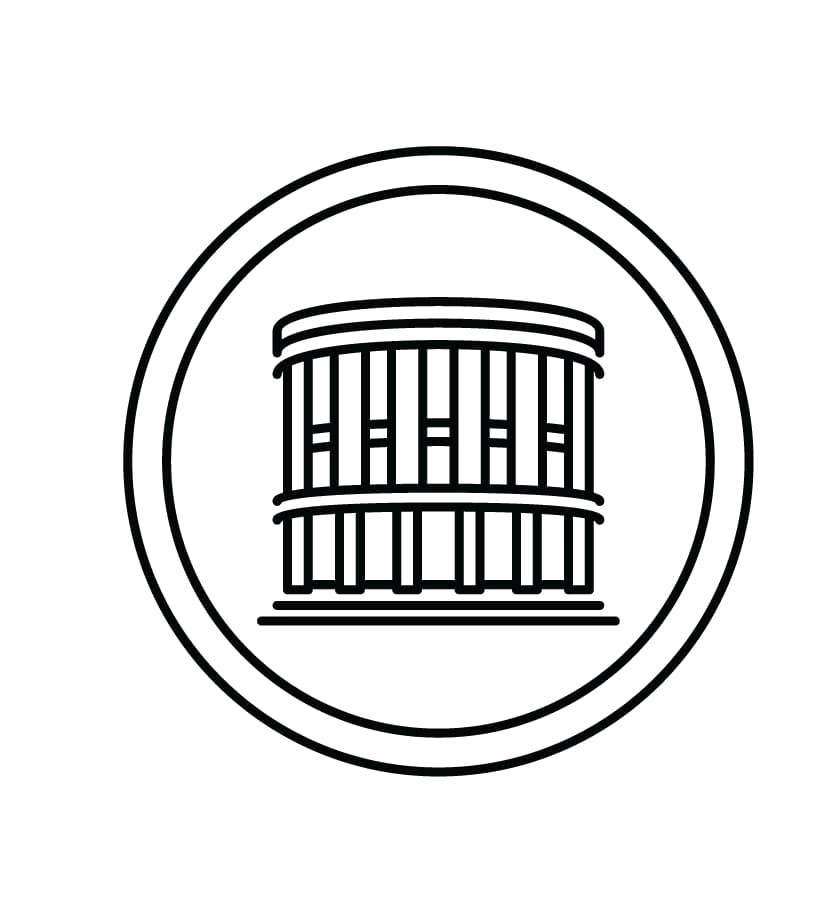 Between 30 September and 2 October 2021, a three-day a conference was held on imagined natures (Imaginované prírody / Natures imagines / Imagines natures) at the Comenius University of Bratislava, organised by Philosophy Institute of the Slovakian Academy of Sciences, the Bratislava International School of Liberal Arts (BISLA), and the Department of Philosophy of the University of Trnava. Our colleague, Dezső Gurka gave a presentation entitled Anthropologie, Psychologie und Malerei. Interpretation der Naturaspekten in den Werken von Gustav Carus.
Between 30 September and 2 October 2021, a three-day a conference was held on imagined natures (Imaginované prírody / Natures imagines / Imagines natures) at the Comenius University of Bratislava, organised by Philosophy Institute of the Slovakian Academy of Sciences, the Bratislava International School of Liberal Arts (BISLA), and the Department of Philosophy of the University of Trnava. Our colleague, Dezső Gurka gave a presentation entitled Anthropologie, Psychologie und Malerei. Interpretation der Naturaspekten in den Werken von Gustav Carus.
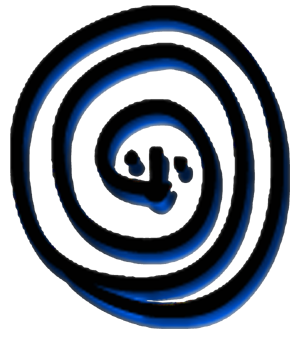 On 21–22 July 2021, the European Association of Social Anthropologists (EASA) and the History of Anthropology Network (HOAN) organised a two-day online conference on Anthropological Pathways and Crossings: Knowledge Production and Transfer in and beyond Europe, where our colleague, Ildikó Sz. Kristóf gave a presentation on The Labyrinths of 19th-Century Anthropology in East-Central Europe: Knowledge Production and Transfer in Ethnographic Shows (Völkerschauen) in Hungary, 1870s–1920s.
On 21–22 July 2021, the European Association of Social Anthropologists (EASA) and the History of Anthropology Network (HOAN) organised a two-day online conference on Anthropological Pathways and Crossings: Knowledge Production and Transfer in and beyond Europe, where our colleague, Ildikó Sz. Kristóf gave a presentation on The Labyrinths of 19th-Century Anthropology in East-Central Europe: Knowledge Production and Transfer in Ethnographic Shows (Völkerschauen) in Hungary, 1870s–1920s.
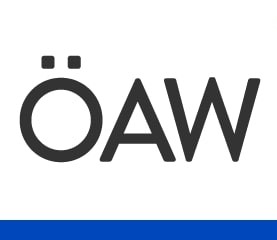 On 6 May 2021, our colleague, Tibor Bodnár-Király held a lecture as part of the “Jour Fixé Kulturwissenschaften” series of the Austrian Academy of Sciences (ÖAW) organized by the Institute of Cultural Studies and Theatre History with the title Enlightenment and Statistics: Mitigation and Adaptation in the Eighteenth-Century Habsburg Monarchy.
On 6 May 2021, our colleague, Tibor Bodnár-Király held a lecture as part of the “Jour Fixé Kulturwissenschaften” series of the Austrian Academy of Sciences (ÖAW) organized by the Institute of Cultural Studies and Theatre History with the title Enlightenment and Statistics: Mitigation and Adaptation in the Eighteenth-Century Habsburg Monarchy.
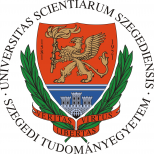 On 28 October 2020, our colleague, Dezső Gurka gave his habilitation lectures at the Faculty of Arts of the University of Szeged. In his German-language academic lecture, he examined the attempt to develop a Schellingian system of aesthetics (Der Versuch zur Entwicklung eines schellingianischen ästetischen Systems: Philochalia von Lajos Schedius) and in a classroom lecture held in Hungarian, he discussed the theosophical elements in the re-thematization of Schellingian philosophy between 1806 and 1809 (Teozófiai hatáselemek a schellingi filozófia 1806 és 1809 közötti áttematizálódásában).
On 28 October 2020, our colleague, Dezső Gurka gave his habilitation lectures at the Faculty of Arts of the University of Szeged. In his German-language academic lecture, he examined the attempt to develop a Schellingian system of aesthetics (Der Versuch zur Entwicklung eines schellingianischen ästetischen Systems: Philochalia von Lajos Schedius) and in a classroom lecture held in Hungarian, he discussed the theosophical elements in the re-thematization of Schellingian philosophy between 1806 and 1809 (Teozófiai hatáselemek a schellingi filozófia 1806 és 1809 közötti áttematizálódásában).
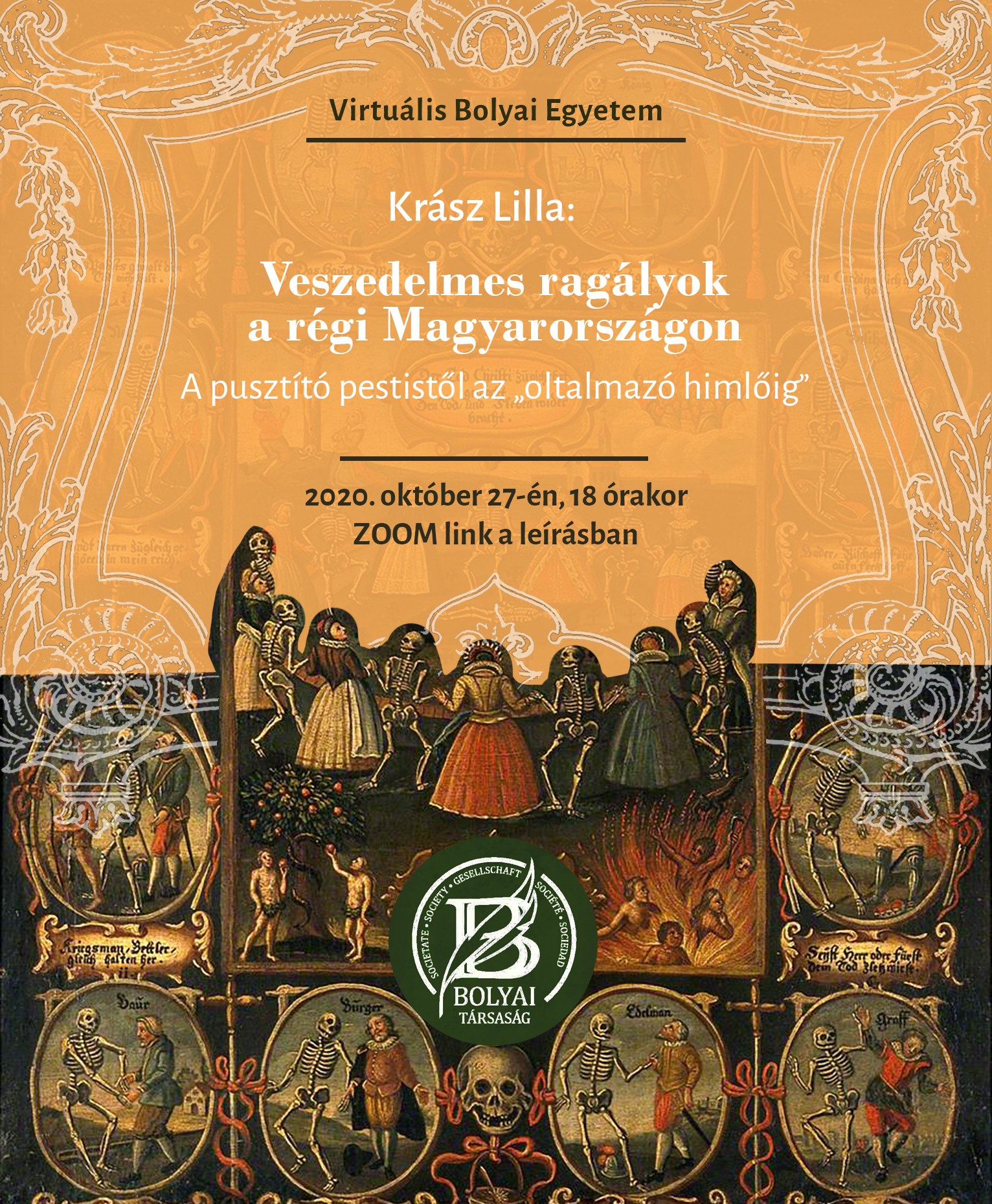 On 27 October 2020, our project leader, Lilla Krász gave an online lecture about the history of epidemics in eighteenth-century Hungary (Dangerous Epidemics in Eighteenth-Century Hungary from the Plague to the ’Protective Pox’). The event was organised by the Bolyai Society and the Babeș–Bolyai University.
On 27 October 2020, our project leader, Lilla Krász gave an online lecture about the history of epidemics in eighteenth-century Hungary (Dangerous Epidemics in Eighteenth-Century Hungary from the Plague to the ’Protective Pox’). The event was organised by the Bolyai Society and the Babeș–Bolyai University.
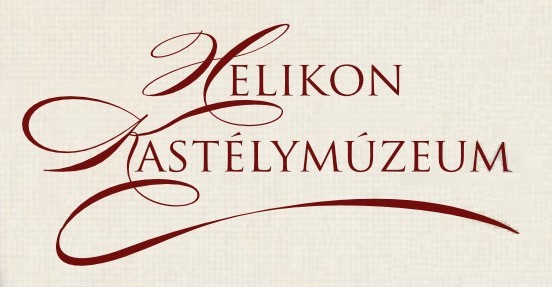 György Kurucz’s new book „Kedves Hazámfiai, mozdulni kell…” Georgikoni peregrinatio oeconomica a 19. század elején (’Dear Fellow Countrymen, we should make a move...’ The technological journeys of Hungary’s first college of farming in the early 19th century) was launched on 13 September 2020 at the Helikon Castle Museum in Keszthely.
György Kurucz’s new book „Kedves Hazámfiai, mozdulni kell…” Georgikoni peregrinatio oeconomica a 19. század elején (’Dear Fellow Countrymen, we should make a move...’ The technological journeys of Hungary’s first college of farming in the early 19th century) was launched on 13 September 2020 at the Helikon Castle Museum in Keszthely.
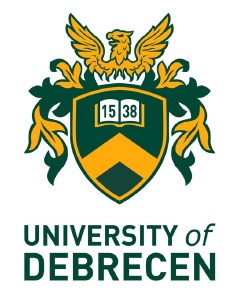 On 30 November, the Philosophy Workshop of the Regional Committee of Debrecen of the Hungarian Academy of Sciences organised a conference on Sound, Word, and Spirit, focusing on the problems of nineteenth-century language philosophy in a broader context. Our colleague, Dezső Gurka participated in the event and spoke about the interpretation of the notion of ‘spirit’ in Schelling’s works between 1805 and 1810.
On 30 November, the Philosophy Workshop of the Regional Committee of Debrecen of the Hungarian Academy of Sciences organised a conference on Sound, Word, and Spirit, focusing on the problems of nineteenth-century language philosophy in a broader context. Our colleague, Dezső Gurka participated in the event and spoke about the interpretation of the notion of ‘spirit’ in Schelling’s works between 1805 and 1810.
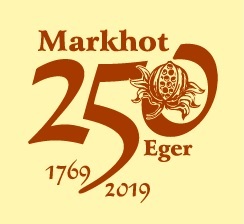 On 28 November 2019, the Eszterházy Károly University organised a conference to commemorate the 250th anniversary of the beginning of medical education in Eger. In the three panels of the conference, the participants discussed the questions of contemporary medical education and public health in eighteenth- and nineteenth-century Eger, as well as Ferenc Markhot’s achievements. At the conference, our project leader, Lilla Krász discussed Ferenc Markhot’s place in the world of respublica litteraria medica.
On 28 November 2019, the Eszterházy Károly University organised a conference to commemorate the 250th anniversary of the beginning of medical education in Eger. In the three panels of the conference, the participants discussed the questions of contemporary medical education and public health in eighteenth- and nineteenth-century Eger, as well as Ferenc Markhot’s achievements. At the conference, our project leader, Lilla Krász discussed Ferenc Markhot’s place in the world of respublica litteraria medica.
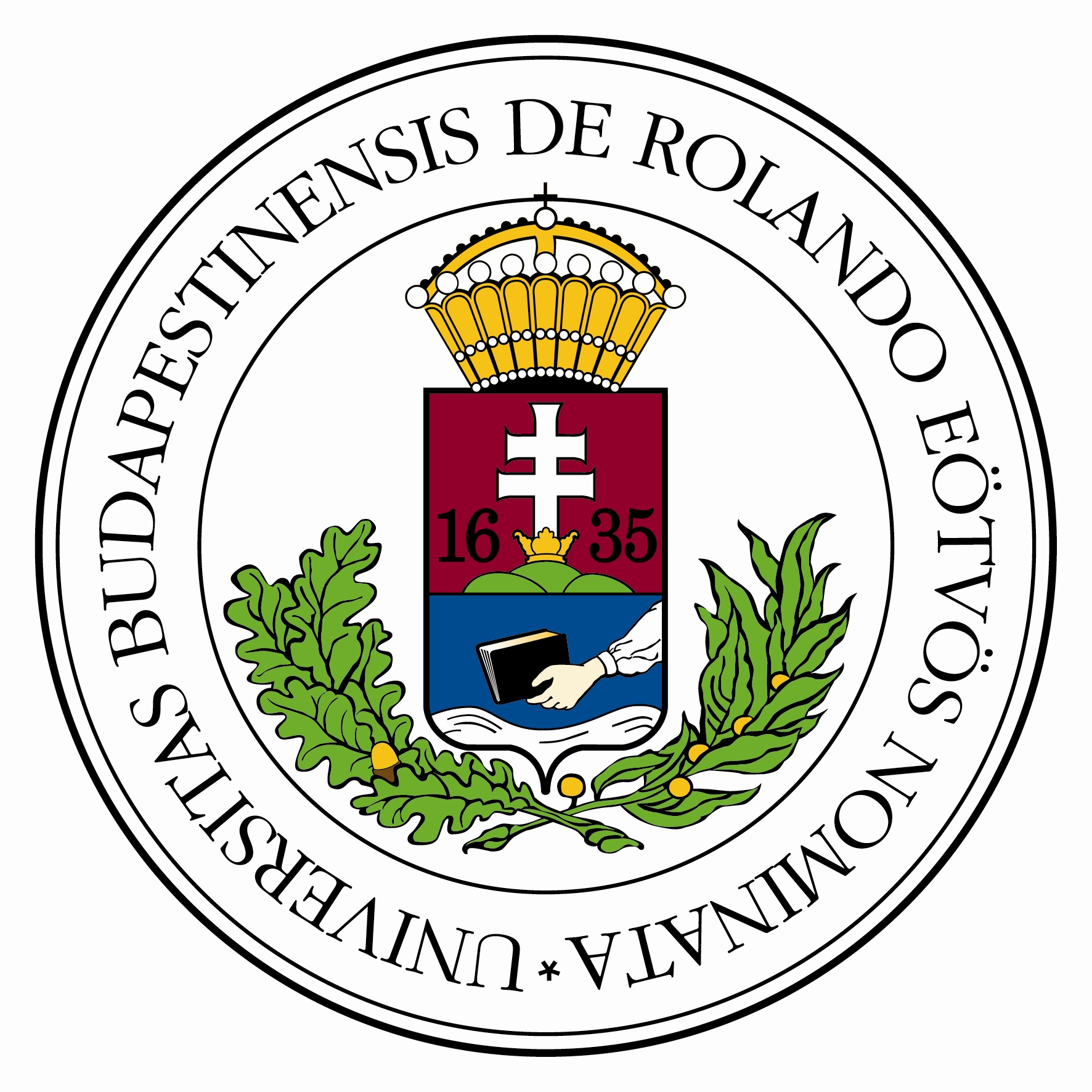 On 9 December 2019, the Department of 18th and 19th–Century Hungarian Literature of the Eötvös Loránd University and the Hungarian Association for the History of Literature, with the support of the Hungarian Academy of Arts organised a conference on Fathers and Sons – The Life and Traditions of László Arany, where our colleague, Piroska Balogh spoke about the relationship of László Arany and the Hungarian Academy of Sciences.
On 9 December 2019, the Department of 18th and 19th–Century Hungarian Literature of the Eötvös Loránd University and the Hungarian Association for the History of Literature, with the support of the Hungarian Academy of Arts organised a conference on Fathers and Sons – The Life and Traditions of László Arany, where our colleague, Piroska Balogh spoke about the relationship of László Arany and the Hungarian Academy of Sciences.
 On 7–8 November 2019, the Institute of Aesthetics and Art Culture of the University of Prešov and the Society for Aesthetics in Slovakia organised an international conference on Aesthetics Education and the Practice of Aesthetics Teaching in the Frame of 19th–20th-century European Aesthetic Thinking – A Dialogue between Traditional and Current Concepts. Our colleague, Piroska Balogh contributed to the conference with a paper on aesthetics at the Royal Hungarian University between 1774–1843, focusing on its first professor’s, Georg Aloys Szerdahely’s oeuvre.
On 7–8 November 2019, the Institute of Aesthetics and Art Culture of the University of Prešov and the Society for Aesthetics in Slovakia organised an international conference on Aesthetics Education and the Practice of Aesthetics Teaching in the Frame of 19th–20th-century European Aesthetic Thinking – A Dialogue between Traditional and Current Concepts. Our colleague, Piroska Balogh contributed to the conference with a paper on aesthetics at the Royal Hungarian University between 1774–1843, focusing on its first professor’s, Georg Aloys Szerdahely’s oeuvre.
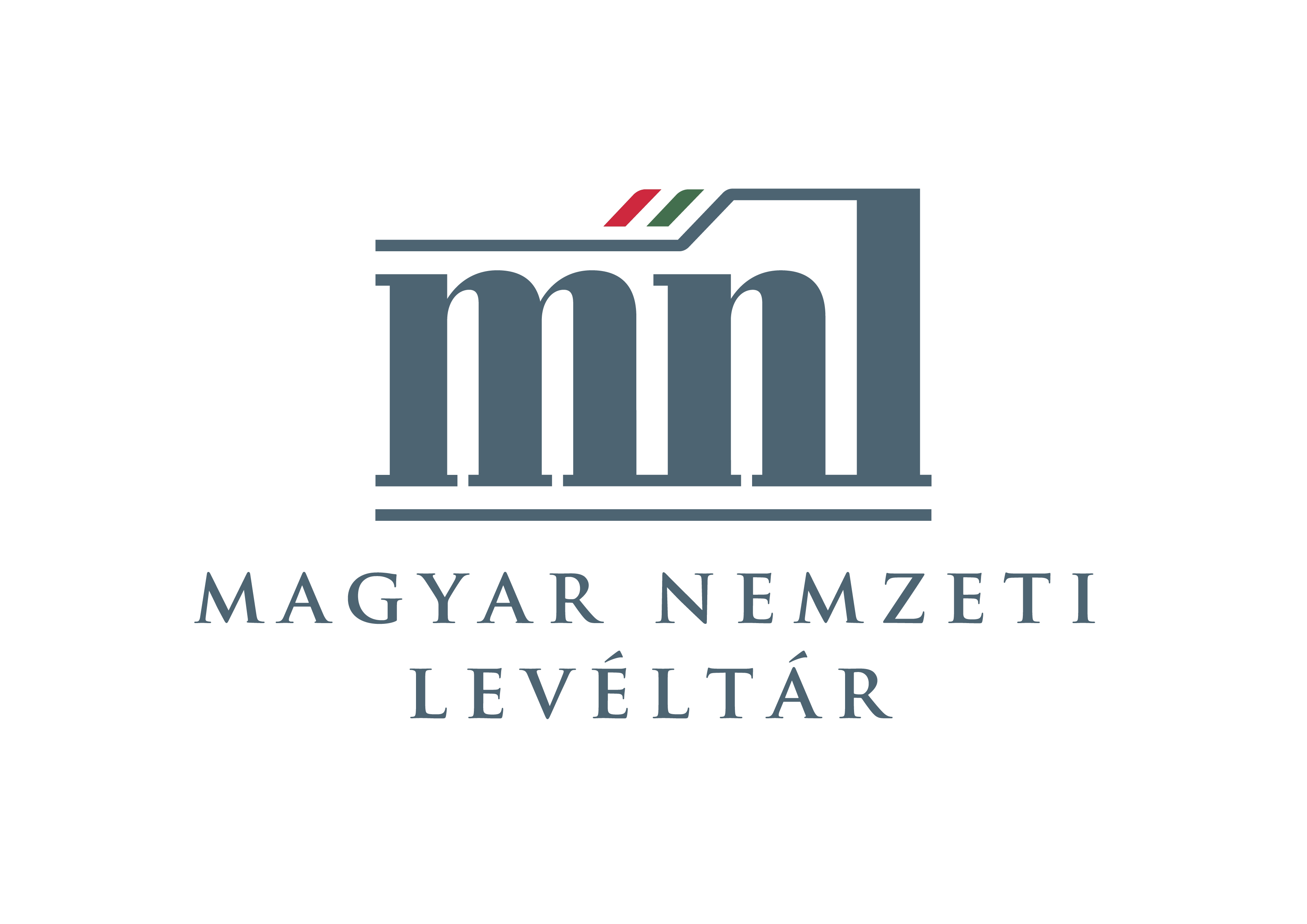 On 14 November 2019, the Tolna County Archives and the Faculty of Cultural Sciences, Education and Regional Development of the University of Pécs organised the 23rd Archival Day, where our colleague, György Kurucz spoke about László Festetics’s pursuits of building economic and scientific relations with Western Europe in the 1820s.
On 14 November 2019, the Tolna County Archives and the Faculty of Cultural Sciences, Education and Regional Development of the University of Pécs organised the 23rd Archival Day, where our colleague, György Kurucz spoke about László Festetics’s pursuits of building economic and scientific relations with Western Europe in the 1820s.
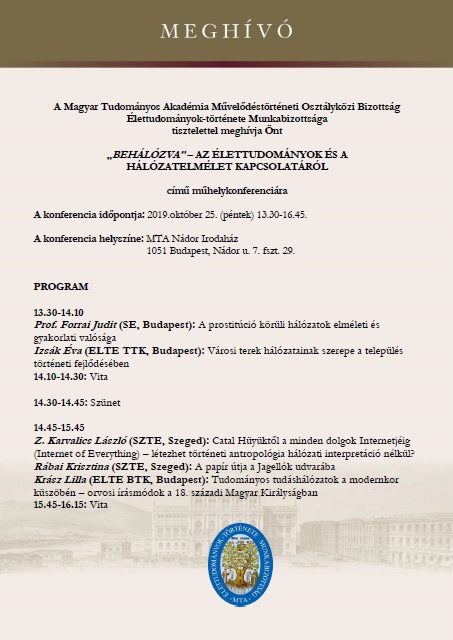 On 25 September 2019, the Sub-Committee on the History of Life Sciences of the Committee on Cultural History of the Hungarian Academy of Sciences organised a conference on the relations between life sciences and network theory. Our project leader, Lilla Krász participated in the event, where she spoke about scientific knowledge networks in the wake of modernity and medical writing in eighteenth-century Hungary.
On 25 September 2019, the Sub-Committee on the History of Life Sciences of the Committee on Cultural History of the Hungarian Academy of Sciences organised a conference on the relations between life sciences and network theory. Our project leader, Lilla Krász participated in the event, where she spoke about scientific knowledge networks in the wake of modernity and medical writing in eighteenth-century Hungary.
 The Historiography Workshop of the University of Debrecen organised a three-day international conference on 17–19 October 2019, where our colleague, Tibor Bodnár-Király spoke about Martin Schwartner and the reappraisal of diplomatics.
The Historiography Workshop of the University of Debrecen organised a three-day international conference on 17–19 October 2019, where our colleague, Tibor Bodnár-Király spoke about Martin Schwartner and the reappraisal of diplomatics.
 On 6–7 September 2019, the Department of Ethnology of the University of Turku organised a memorial conference in honour of Professor Ilmar Talve. Our colleague, Ildikó Sz. Kristóf participated in the event and gave a talk about the significance of Ilmar Talve's Soumen kansankulttuuri in the light of European historical anthropology in the 1980s and 1990s.
On 6–7 September 2019, the Department of Ethnology of the University of Turku organised a memorial conference in honour of Professor Ilmar Talve. Our colleague, Ildikó Sz. Kristóf participated in the event and gave a talk about the significance of Ilmar Talve's Soumen kansankulttuuri in the light of European historical anthropology in the 1980s and 1990s.
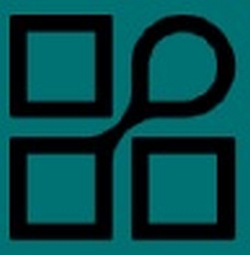 The Research Centre for Science of the Faculty of Social Sciences of Eötvös Loránd University and the Complex Committee on the History of Science and Technology of the Hungarian Academy of Sciences organised a conference on 6 September 2019. Two of our colleague participated in the event. Lilla Krász spoke about the medical policies and local communities in eighteenth-century Hungary and Dezső Gurka discussed the local modulations of Neptunism in Jena at the turn of the eighteenth and nineteenth centuries.
The Research Centre for Science of the Faculty of Social Sciences of Eötvös Loránd University and the Complex Committee on the History of Science and Technology of the Hungarian Academy of Sciences organised a conference on 6 September 2019. Two of our colleague participated in the event. Lilla Krász spoke about the medical policies and local communities in eighteenth-century Hungary and Dezső Gurka discussed the local modulations of Neptunism in Jena at the turn of the eighteenth and nineteenth centuries.
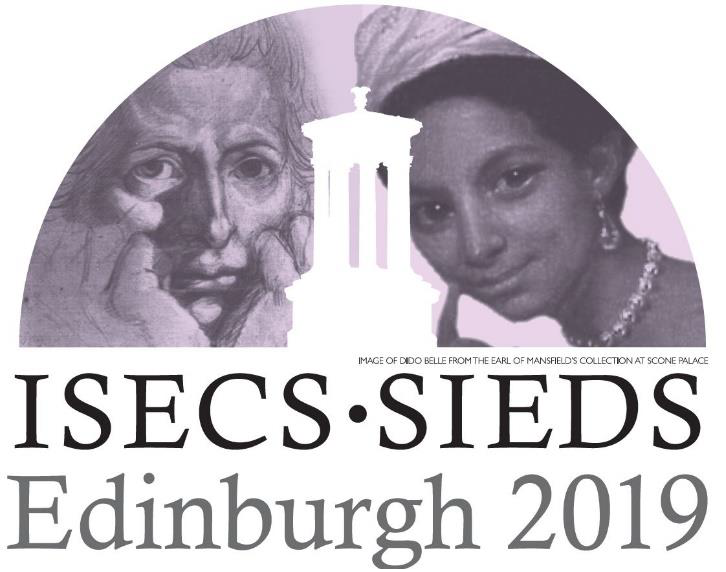 On 14–19 July 2019, the British Society for Eighteenth-Century Studies hosted the ISECS International Congress on the Enlightenment at the University of Edinburgh. Three of our colleagues gave presentations at the bilingual (English and French) conference. Lilla Krász spoke about the cultures and practices of medical knowledge in the Kingdom of Hungary in the eighteenth century; György Kurucz discussed the agricultural study tours of Hungarian intellectuals in early nineteenth-century Western Europe, whereas Tibor Bodnár-Király addressed the questions of scientific constructions and political identities on the example of national characterology in eighteenth-century Hungarian state and geographical descriptions.
On 14–19 July 2019, the British Society for Eighteenth-Century Studies hosted the ISECS International Congress on the Enlightenment at the University of Edinburgh. Three of our colleagues gave presentations at the bilingual (English and French) conference. Lilla Krász spoke about the cultures and practices of medical knowledge in the Kingdom of Hungary in the eighteenth century; György Kurucz discussed the agricultural study tours of Hungarian intellectuals in early nineteenth-century Western Europe, whereas Tibor Bodnár-Király addressed the questions of scientific constructions and political identities on the example of national characterology in eighteenth-century Hungarian state and geographical descriptions.
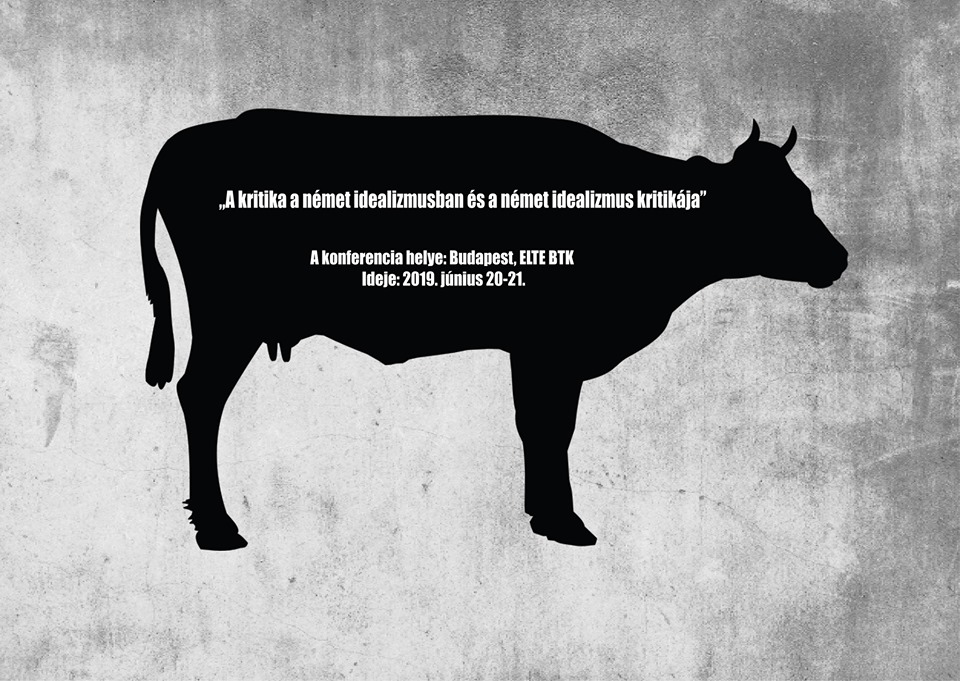 On 20–21 June 2019, the Critical Studies Research Group of the University of Pécs and the Hungarian Academy of Sciences and the Department of Modern and Contemporary Philosophy of the Eötvös Loránd University organised a conference on Criticism in German Idealism and the Critique of German Idealism. Our colleague, Dezső Gurka contributed to the event with a presentation on the impact of Jacob Friedrich Fries’s criticism of Schelling on the reception of Romantic natural philosophy.
On 20–21 June 2019, the Critical Studies Research Group of the University of Pécs and the Hungarian Academy of Sciences and the Department of Modern and Contemporary Philosophy of the Eötvös Loránd University organised a conference on Criticism in German Idealism and the Critique of German Idealism. Our colleague, Dezső Gurka contributed to the event with a presentation on the impact of Jacob Friedrich Fries’s criticism of Schelling on the reception of Romantic natural philosophy.
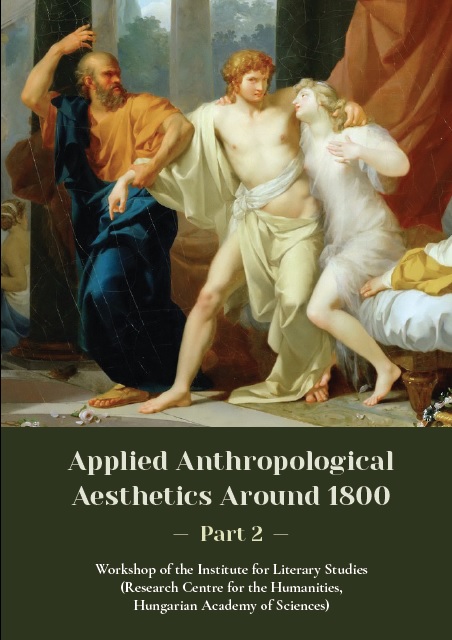 On 7 June 2019, an international workshop was organised in the Library and Information Centre of the Hungarian Academy of Sciences as a sequel to the conference Applied Anthropological Aesthetics around 1800 held on 23 November 2018. Our colleague, Piroska Balogh contributed to the event and discussed the connections between Johann Ludwig Schedius’s social theory and his theory on aesthetics.
On 7 June 2019, an international workshop was organised in the Library and Information Centre of the Hungarian Academy of Sciences as a sequel to the conference Applied Anthropological Aesthetics around 1800 held on 23 November 2018. Our colleague, Piroska Balogh contributed to the event and discussed the connections between Johann Ludwig Schedius’s social theory and his theory on aesthetics.
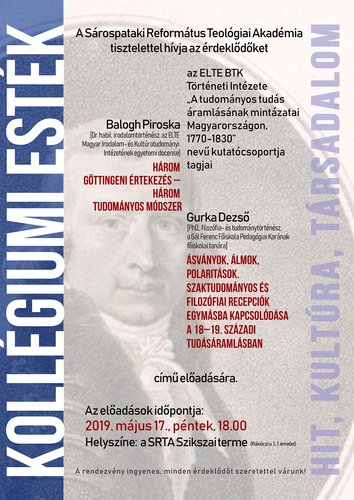 On 17 May 2019, two of our colleagues, Piroska Balogh and Dezső Gurka gave lectures at the Reformed Theology Academy of Sárospatak. Piroska Balogh discussed three treatises from Göttingen and their methodological aspects (Three Treatises from Göttingen – Three Scientific Methods), whereas Dezső Gurka talked about the interrelations of scientific and philosophical receptions in the eighteenth- and nineteenth-century circulation of knowledge (Minerals, Dreams, Polarities. The Interrelations of Scientific and Philosophical Receptions in the Eighteenth- and Nineteenth-Century Circulation of Knowledge).
On 17 May 2019, two of our colleagues, Piroska Balogh and Dezső Gurka gave lectures at the Reformed Theology Academy of Sárospatak. Piroska Balogh discussed three treatises from Göttingen and their methodological aspects (Three Treatises from Göttingen – Three Scientific Methods), whereas Dezső Gurka talked about the interrelations of scientific and philosophical receptions in the eighteenth- and nineteenth-century circulation of knowledge (Minerals, Dreams, Polarities. The Interrelations of Scientific and Philosophical Receptions in the Eighteenth- and Nineteenth-Century Circulation of Knowledge).
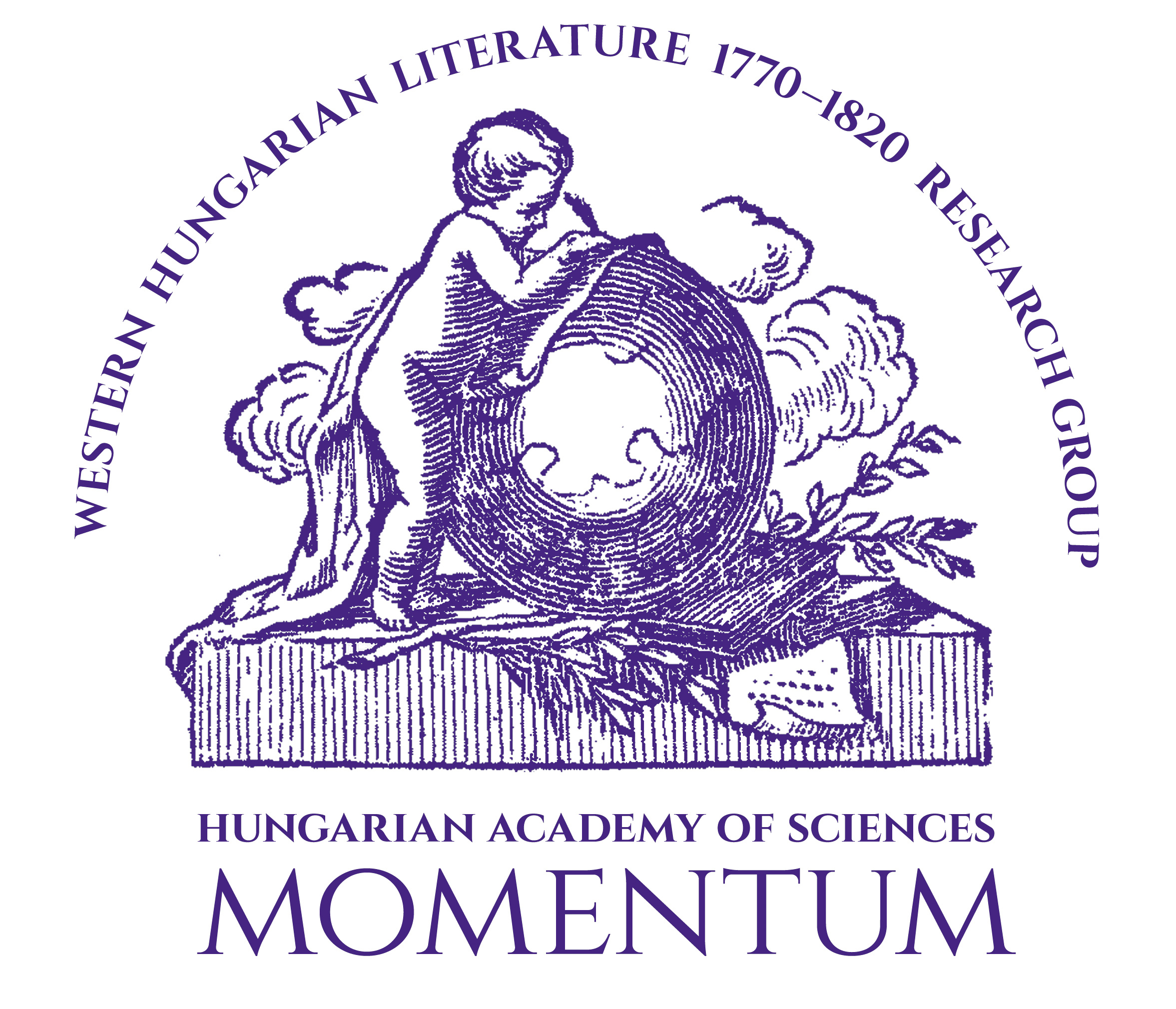 On 30 May – 1 June, the ’Literature in Western Hungary, 1770–1820’ Research Group (supported by the Hungarian Academy of Sciences) and the ’The Patterns of the Circulation of Scientific Knowledge in Hungary, 1770–1830’ Research Group (supported by the National Research, Development and Innovations Office) organised a conference on The Culture of the Aristocracy in the Habsburg Monarchy, 1750–1820. The conference was held at two venues, at the Helikon Castle Museum (30–31 May) and at the Amazon House Visitor Centre (1 June) in Keszthely.
On 30 May – 1 June, the ’Literature in Western Hungary, 1770–1820’ Research Group (supported by the Hungarian Academy of Sciences) and the ’The Patterns of the Circulation of Scientific Knowledge in Hungary, 1770–1830’ Research Group (supported by the National Research, Development and Innovations Office) organised a conference on The Culture of the Aristocracy in the Habsburg Monarchy, 1750–1820. The conference was held at two venues, at the Helikon Castle Museum (30–31 May) and at the Amazon House Visitor Centre (1 June) in Keszthely.
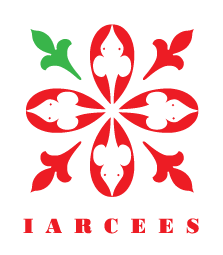 On 9–11 May 2019, the Dublin City University and the Irish Association for Russian, Central and East European Studies organised a conference on State and Non-State Actors in Eastern and Central Europe: Past, Present and Future. Our colleague, Tibor Bodnár-Király presented a paper that addressed the questions of conceptualising the state in eighteenth-century Hungary.
On 9–11 May 2019, the Dublin City University and the Irish Association for Russian, Central and East European Studies organised a conference on State and Non-State Actors in Eastern and Central Europe: Past, Present and Future. Our colleague, Tibor Bodnár-Király presented a paper that addressed the questions of conceptualising the state in eighteenth-century Hungary.
 On 29 March 2019, Tibor Bodnár-Király held a lecture about state sciences and progress in eighteenth-century intellectual history at the Historiography Workshop of the University of Debrecen.
On 29 March 2019, Tibor Bodnár-Király held a lecture about state sciences and progress in eighteenth-century intellectual history at the Historiography Workshop of the University of Debrecen.
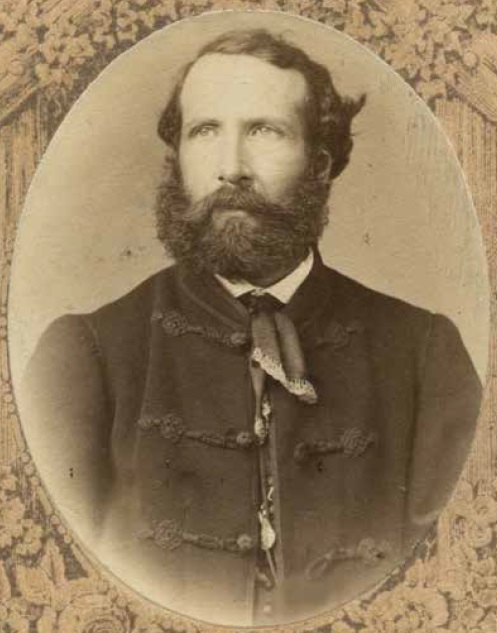 On 25 February 2019, a conference was organised at the Hungarian National Museum to commemorate Pál Rosti’s donation of his collection of photographs taken during his travels in Latin America. Our colleague, Ildikó Sz. Kristóf participated in the event and in her presentation, she spoke about Alexander von Humboldt and Hungary and the questions of universal ethnography in the long nineteeth century.
On 25 February 2019, a conference was organised at the Hungarian National Museum to commemorate Pál Rosti’s donation of his collection of photographs taken during his travels in Latin America. Our colleague, Ildikó Sz. Kristóf participated in the event and in her presentation, she spoke about Alexander von Humboldt and Hungary and the questions of universal ethnography in the long nineteeth century.
 On 25 February 2019, Tibor Bodnár-Király held a lecture about the research possibilities of eighteenth-century state descriptions and the Hungarian Enlightenment at the common session of the Research Group for Reformation and Early Modern Cultural History and the Early Hungarian Literature Doctoral Programme of the Institute of Hungarian Literature and Cultural Studies of the University of Debrecen.
On 25 February 2019, Tibor Bodnár-Király held a lecture about the research possibilities of eighteenth-century state descriptions and the Hungarian Enlightenment at the common session of the Research Group for Reformation and Early Modern Cultural History and the Early Hungarian Literature Doctoral Programme of the Institute of Hungarian Literature and Cultural Studies of the University of Debrecen.
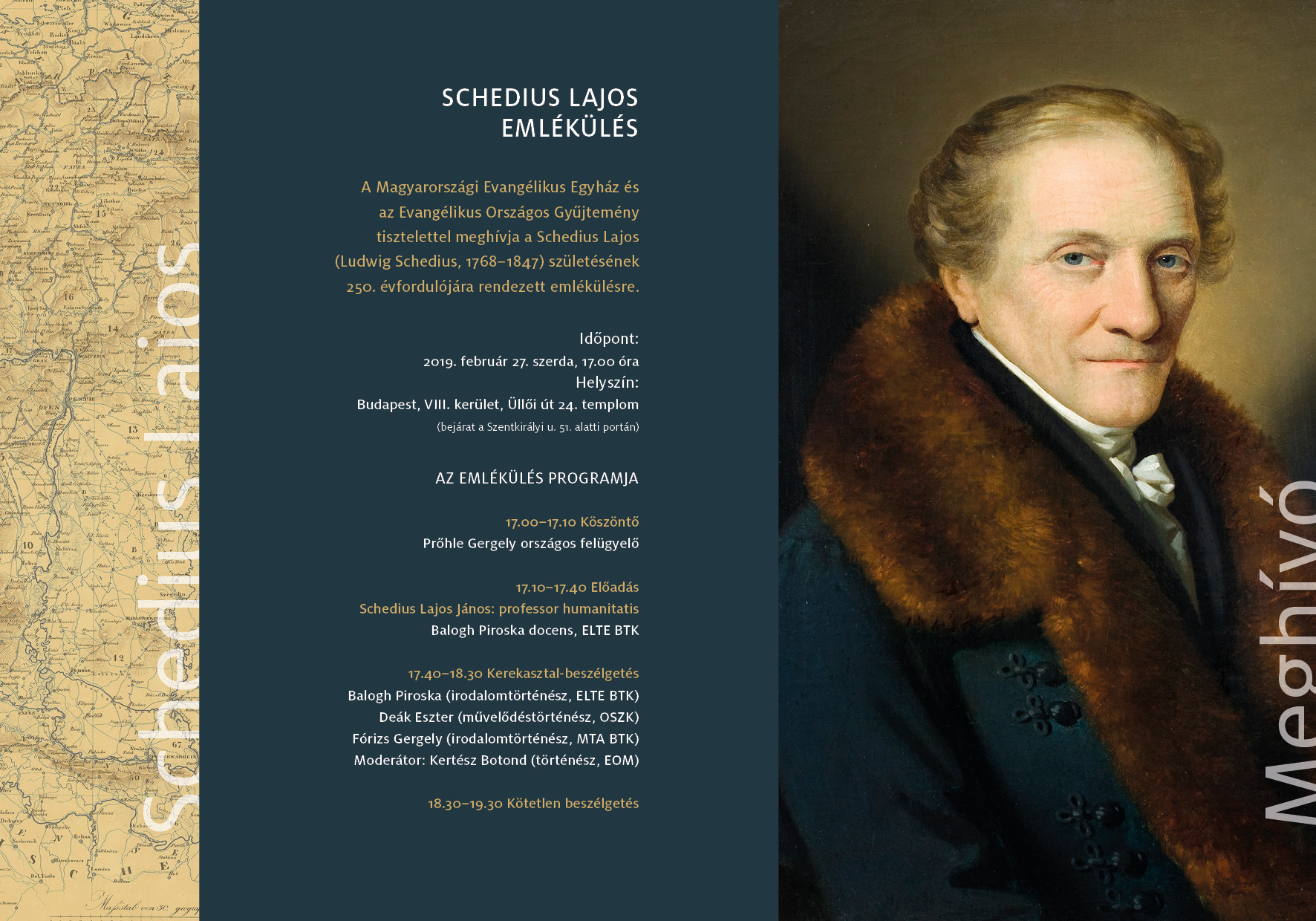 On 27 February 2019, the Evangelical Lutheran Church in Hungary and the Lutheran Central Collection organised a conference to commemorate the 250th anniversary of Lajos Schedius’s birth. The lectures were followed by a roundtable discussion. Our colleague, Piroska Balogh gave a presentation (Lajos János Schedius: professor humanitatis) and participated in the roundtable.
On 27 February 2019, the Evangelical Lutheran Church in Hungary and the Lutheran Central Collection organised a conference to commemorate the 250th anniversary of Lajos Schedius’s birth. The lectures were followed by a roundtable discussion. Our colleague, Piroska Balogh gave a presentation (Lajos János Schedius: professor humanitatis) and participated in the roundtable.
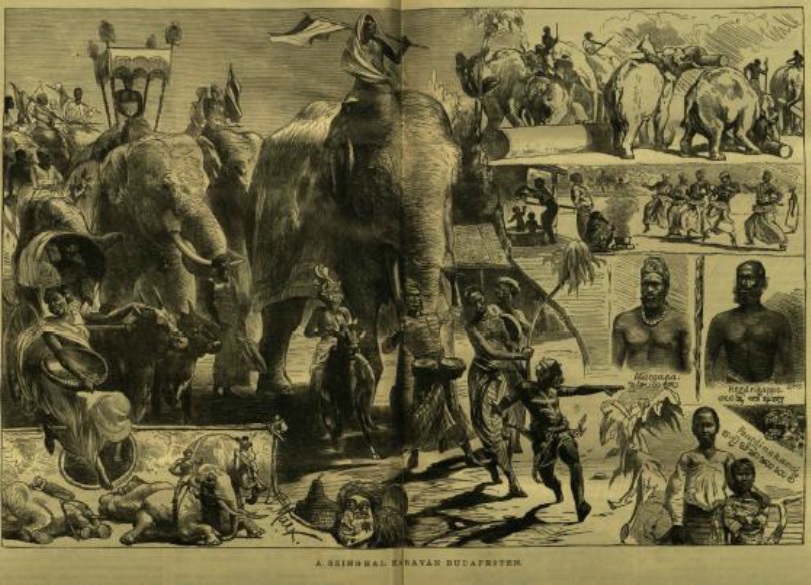 On 17–18 January 2019, the Central European University, the Hungarian Academy of Sciences, and the Polish Academy of Sciences organised an international conference on Staged Otherness, c. 1850–1989: East-Central European Responses and Contexts. Our colleague, Ildikó Sz. Kristóf participated in the event and gave a presentation on ethnographic shows and scholarship in Hungary in the late nineteenth century.
On 17–18 January 2019, the Central European University, the Hungarian Academy of Sciences, and the Polish Academy of Sciences organised an international conference on Staged Otherness, c. 1850–1989: East-Central European Responses and Contexts. Our colleague, Ildikó Sz. Kristóf participated in the event and gave a presentation on ethnographic shows and scholarship in Hungary in the late nineteenth century.
 The Complex Committee on the History of Science and Technology of the Hungarian Academy of Sciences organised a conference on 18 January 2019 to commemorate its 45th anniversary. At the event, our project team leader, Lilla Krász spoke about the present state of the historiography of science and our project, The Patterns of the Circulation of Scientific Knowledge in Hungary, 1770–1830.
The Complex Committee on the History of Science and Technology of the Hungarian Academy of Sciences organised a conference on 18 January 2019 to commemorate its 45th anniversary. At the event, our project team leader, Lilla Krász spoke about the present state of the historiography of science and our project, The Patterns of the Circulation of Scientific Knowledge in Hungary, 1770–1830.
 On 13 December 2018, our colleague, Ildikó Sz. Kristóf held a lecture in the Doctoral School of History of Eötvös Loránd University, where she spoke about the representations of otherness and the sources of the history of anthropology in early modern Hungary.
On 13 December 2018, our colleague, Ildikó Sz. Kristóf held a lecture in the Doctoral School of History of Eötvös Loránd University, where she spoke about the representations of otherness and the sources of the history of anthropology in early modern Hungary.
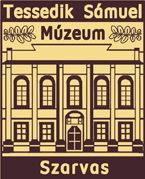 On 5 December 2018, as part of a new open lecture series at the City Library of Szarvas, our colleague, Dezső Gurka gave a presentation about Hungarian students at eighteenth-century German universities.
On 5 December 2018, as part of a new open lecture series at the City Library of Szarvas, our colleague, Dezső Gurka gave a presentation about Hungarian students at eighteenth-century German universities.
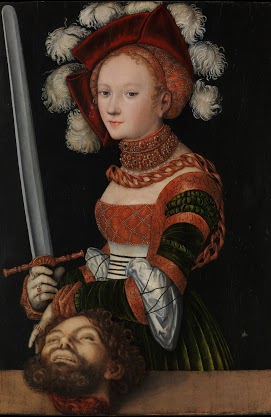 On 15 November 2018 the Tamás Molnár Research Centre of the National University of Public Service and the Institute for Political Science of the HAS Centre for Political Science organised a conference, the theme of which was the challenge of reality. The main aim of the organisers was to create a forum for researchers in the broader field of political theory. The conference focused on the questions and answers of political theory, political philosophy, and intellectual history to the challenges of political reality. Our colleague, Tibor Bodnár-Király participated in the event and discussed the reason of state and the description of the state in eighteenth-century German political science.
On 15 November 2018 the Tamás Molnár Research Centre of the National University of Public Service and the Institute for Political Science of the HAS Centre for Political Science organised a conference, the theme of which was the challenge of reality. The main aim of the organisers was to create a forum for researchers in the broader field of political theory. The conference focused on the questions and answers of political theory, political philosophy, and intellectual history to the challenges of political reality. Our colleague, Tibor Bodnár-Király participated in the event and discussed the reason of state and the description of the state in eighteenth-century German political science.
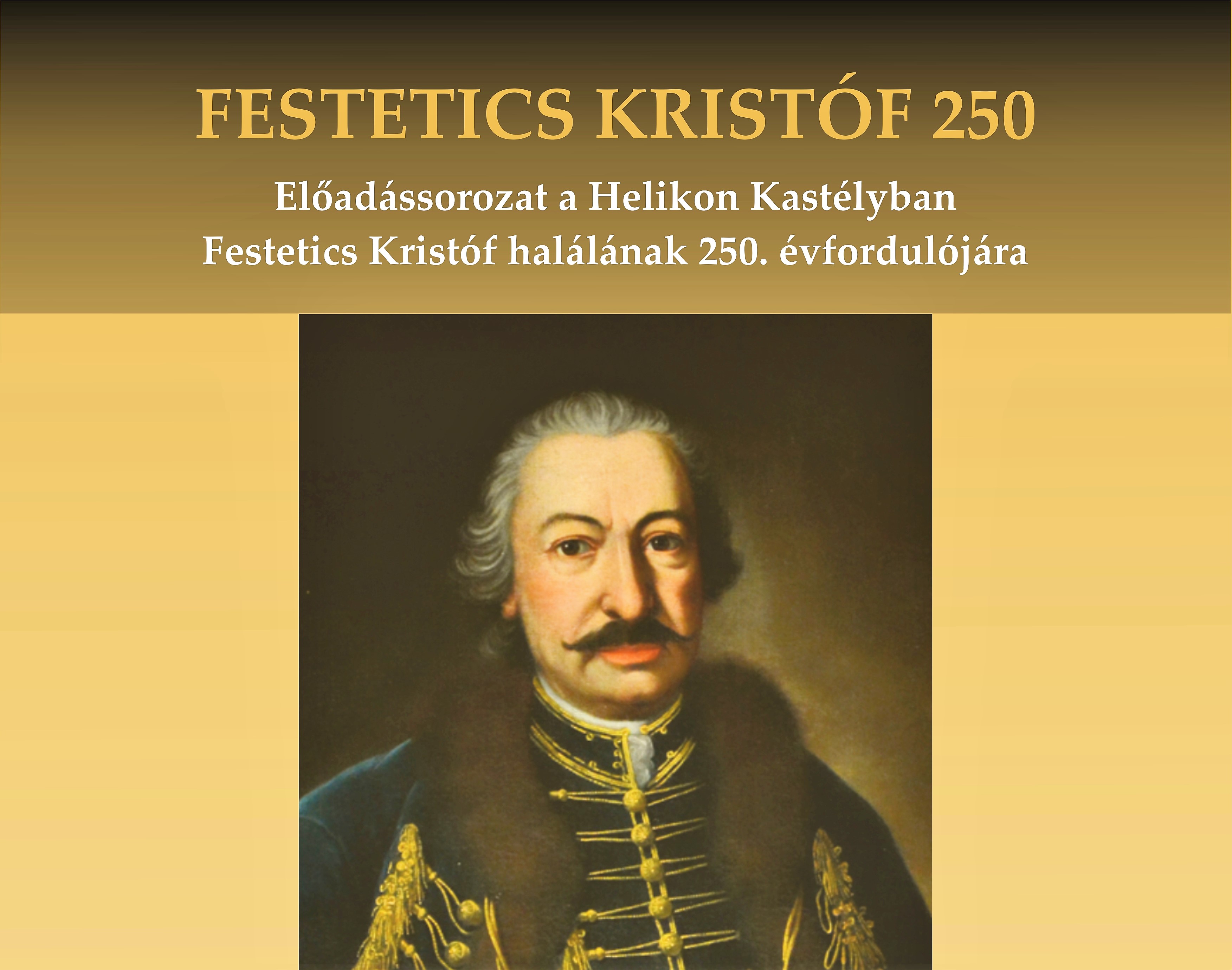 As part of the lecture series commemorating the 250th anniversary of Kristóf Festetics’s death, our project leader, Lilla Krász held an open lecture on physicians, healers, and their patients in the age of Kristóf Festetics.
As part of the lecture series commemorating the 250th anniversary of Kristóf Festetics’s death, our project leader, Lilla Krász held an open lecture on physicians, healers, and their patients in the age of Kristóf Festetics.
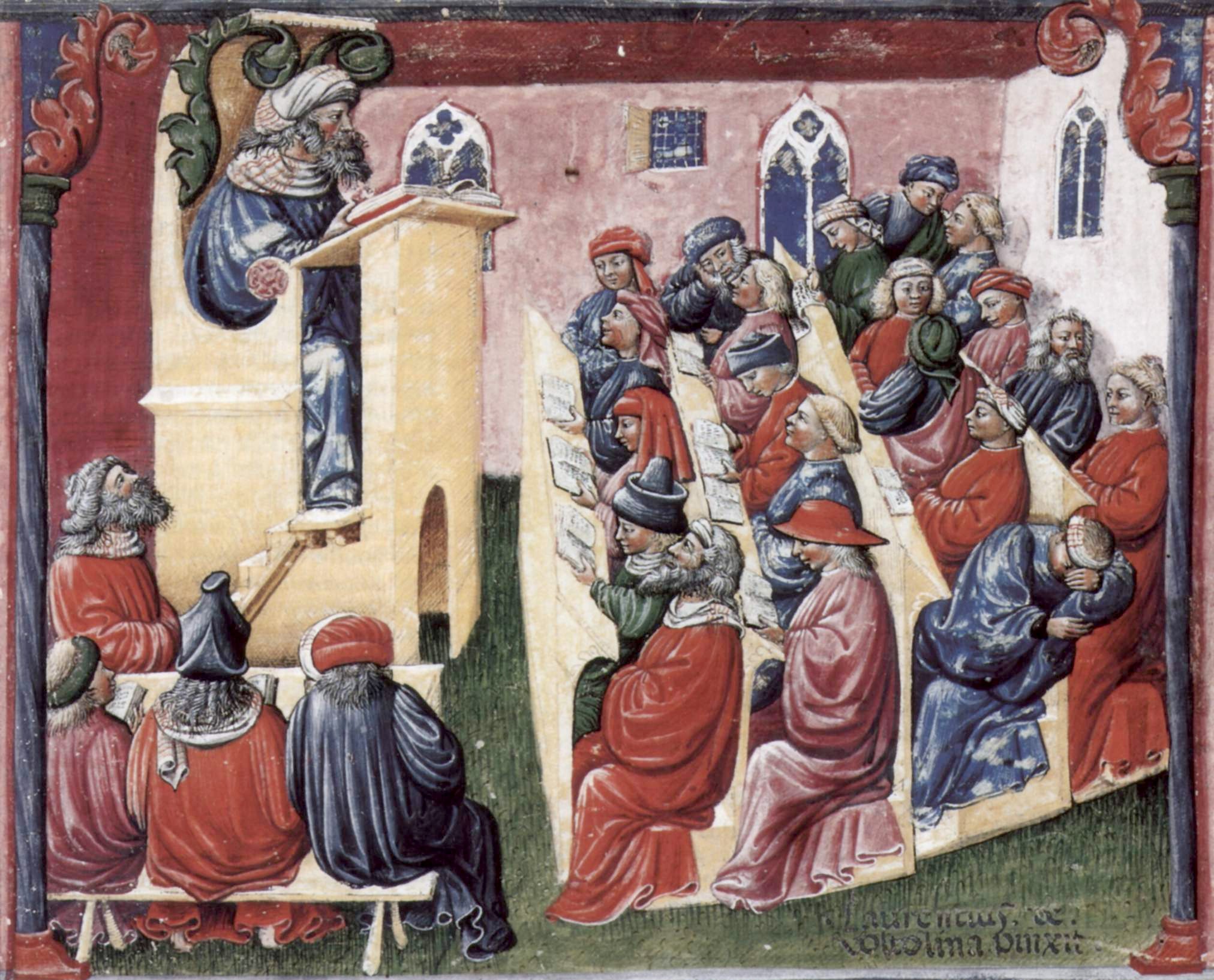 The Central European University (CEU) organised a conference on Academic Freedom in Historical Perspective between 8–10 November 2018. Our colleague, Piroska Balogh participated in the event, where she presented a case study on Johann Ludwig Schedius (1768–1847) and the question of academic freedom (From the Freedom of Göttingen under the Control of Vienna. A Case Study of Professor Johann Ludwig Schedius [1768–1847]).
The Central European University (CEU) organised a conference on Academic Freedom in Historical Perspective between 8–10 November 2018. Our colleague, Piroska Balogh participated in the event, where she presented a case study on Johann Ludwig Schedius (1768–1847) and the question of academic freedom (From the Freedom of Göttingen under the Control of Vienna. A Case Study of Professor Johann Ludwig Schedius [1768–1847]).
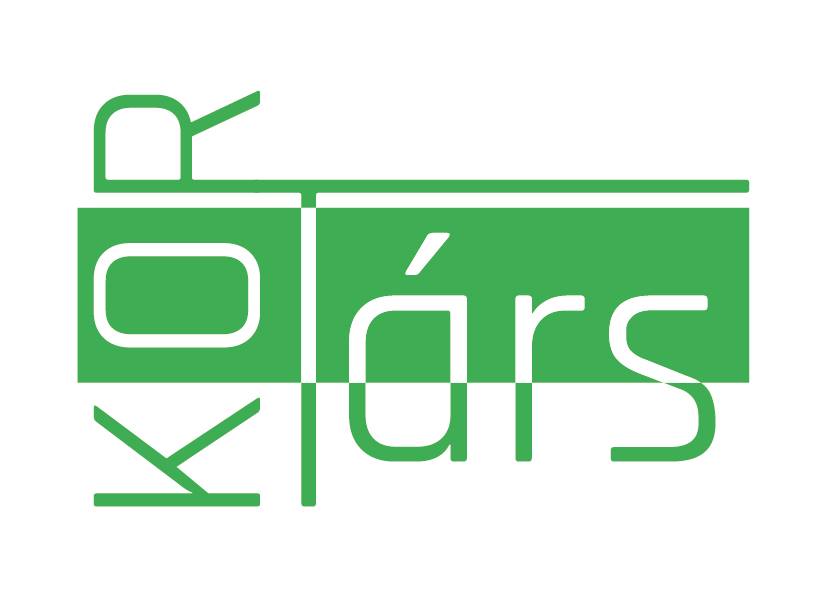 The University of Szeged and Eötvös Loránd University organised this year’s Conference of Young Scholars (FIKON) between 25–26 October 2018, where the participants discussed contemporary phenomena from the points of view of literature and history. The external member of our project, Janka Kovács spoke about sermons serving as the media of knowledge transfer and the representations of mental illnesses in late eighteenth-century and early nineteenth-century sermons.
The University of Szeged and Eötvös Loránd University organised this year’s Conference of Young Scholars (FIKON) between 25–26 October 2018, where the participants discussed contemporary phenomena from the points of view of literature and history. The external member of our project, Janka Kovács spoke about sermons serving as the media of knowledge transfer and the representations of mental illnesses in late eighteenth-century and early nineteenth-century sermons.
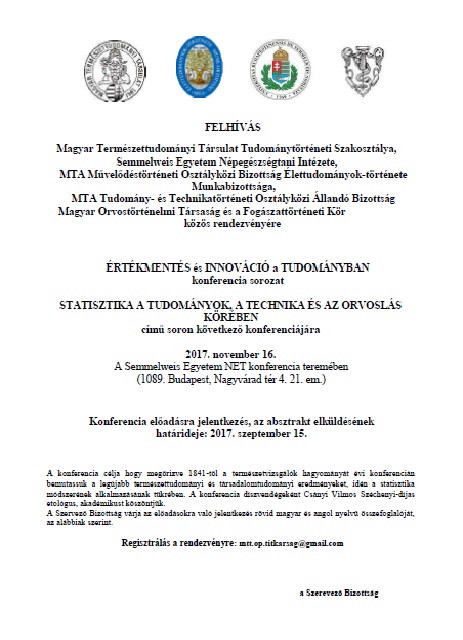 As part of the conference series Value Preservation and Innovation in the Sciences, the Department of the History of Science of the Hungarian Society for Natural Sciences, the Department of Public Health of the Semmelweis University, the Sub-Committee on the History of Life Sciences of the Committee on Cultural History of the Hungarian Academy of Sciences and the Company of Dental History of the Hungarian Society for the History of Medicine organised a two-day conference on statistics in the mirror of the sciences, technology, and medicine on 16–17 November 2017. Our colleague, Tibor Bodnár-Király presented his findings at the conference on statistics within the system of sciences in the Enlightenment.
As part of the conference series Value Preservation and Innovation in the Sciences, the Department of the History of Science of the Hungarian Society for Natural Sciences, the Department of Public Health of the Semmelweis University, the Sub-Committee on the History of Life Sciences of the Committee on Cultural History of the Hungarian Academy of Sciences and the Company of Dental History of the Hungarian Society for the History of Medicine organised a two-day conference on statistics in the mirror of the sciences, technology, and medicine on 16–17 November 2017. Our colleague, Tibor Bodnár-Király presented his findings at the conference on statistics within the system of sciences in the Enlightenment.
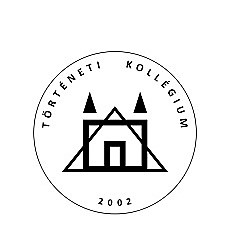 The College of History of the Institute of History, Eötvös Loránd University organised a conference on 17 October 2018 on the interactions between psychology and history. The external member of our project team, Janka Kovács presented a paper about the proposed therapies for the mentally ill in Hungary at the turn eighteenth and nineteenth centuries.
The College of History of the Institute of History, Eötvös Loránd University organised a conference on 17 October 2018 on the interactions between psychology and history. The external member of our project team, Janka Kovács presented a paper about the proposed therapies for the mentally ill in Hungary at the turn eighteenth and nineteenth centuries.
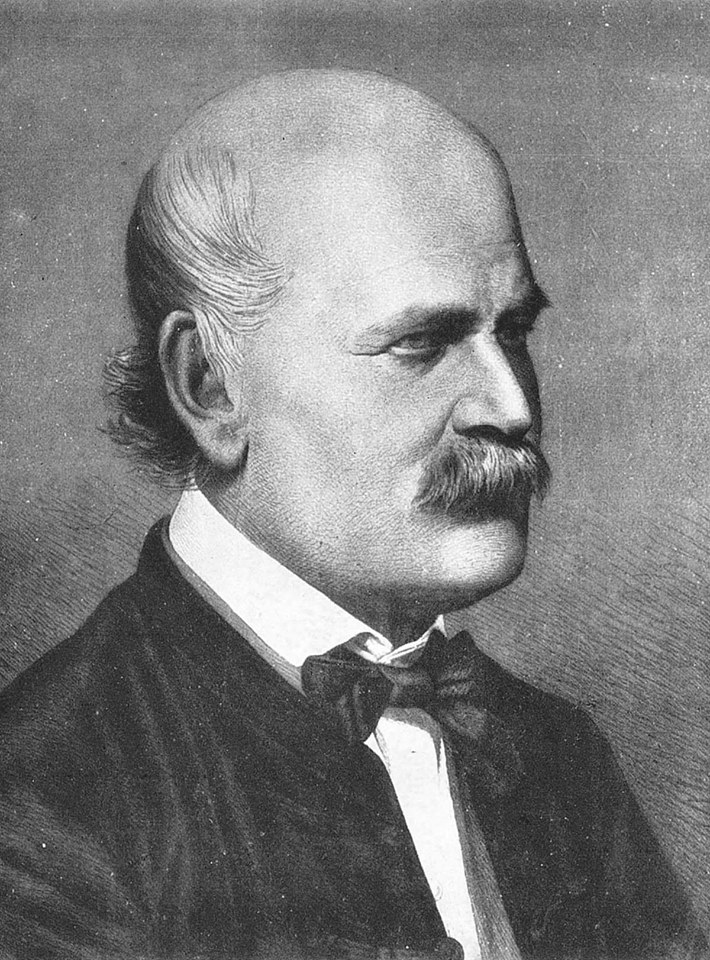 On 15 October 2018, to celebrate Global Handwashing Day and to commemorate the 200th anniversary of Ignaz Semmelweis’s birth, an exhibition was held at the Hungarian Cultural and Information Centre in Stuttgart. Our project leader, Lilla Krász participated in the event and gave a presentation about the scientification (Verwissenschaftlichung) of obstetrics before Ignaz Semmelweis.
On 15 October 2018, to celebrate Global Handwashing Day and to commemorate the 200th anniversary of Ignaz Semmelweis’s birth, an exhibition was held at the Hungarian Cultural and Information Centre in Stuttgart. Our project leader, Lilla Krász participated in the event and gave a presentation about the scientification (Verwissenschaftlichung) of obstetrics before Ignaz Semmelweis.
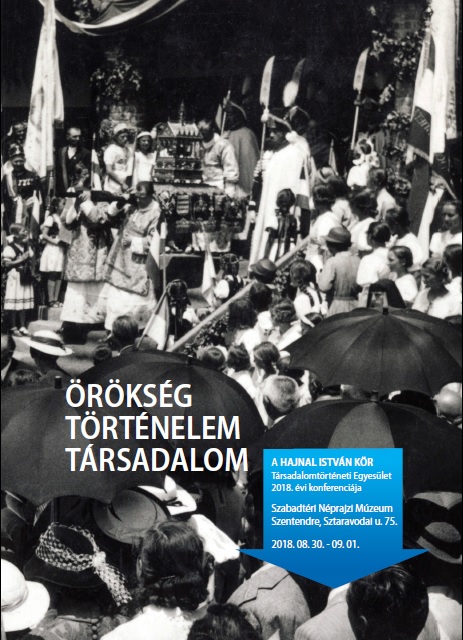 The István Hajnal Circle – Hungarian Social History Association organised its annual conference at Szentendre between 30 August 2018 and 1 September 2018 on the intersections of heritage, history, and society. In the doctoral panel of the conference, the external member of our project team, Janka Kovács presented a paper on the representations of mental illnesses in medical dissertations between 1750 and 1830.
The István Hajnal Circle – Hungarian Social History Association organised its annual conference at Szentendre between 30 August 2018 and 1 September 2018 on the intersections of heritage, history, and society. In the doctoral panel of the conference, the external member of our project team, Janka Kovács presented a paper on the representations of mental illnesses in medical dissertations between 1750 and 1830.
 The European Association of Social Anthropologists organised a four-day international conference between 14–17 August 2018 on the topics of staying, moving, and settling. Our colleague, Ildikó Sz. Kristóf gave a presentation in the panel ‘Peripheral’ anthropologies of Europe. Their histories and intellectual genealogies on the agents and contexts of the appearance of global ethnography/anthropology in Hungary between 1760 and 1830.
The European Association of Social Anthropologists organised a four-day international conference between 14–17 August 2018 on the topics of staying, moving, and settling. Our colleague, Ildikó Sz. Kristóf gave a presentation in the panel ‘Peripheral’ anthropologies of Europe. Their histories and intellectual genealogies on the agents and contexts of the appearance of global ethnography/anthropology in Hungary between 1760 and 1830.
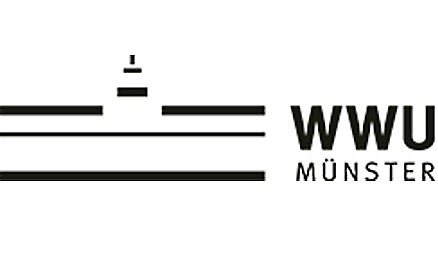 On 26–27 June 2018, the Cluster of Excellence ‘Religion and Politics’ of the University of Münster organised a two-day workshop on David Cranz and the construction of knowledge about Greenland. Our colleague, Ildikó Sz. Kristóf participated in the workshop and gave a presentation about the Inuit culture and the emergence of the science of anthropology in late eighteenth- and early nineteenth-century Hungary.
On 26–27 June 2018, the Cluster of Excellence ‘Religion and Politics’ of the University of Münster organised a two-day workshop on David Cranz and the construction of knowledge about Greenland. Our colleague, Ildikó Sz. Kristóf participated in the workshop and gave a presentation about the Inuit culture and the emergence of the science of anthropology in late eighteenth- and early nineteenth-century Hungary.
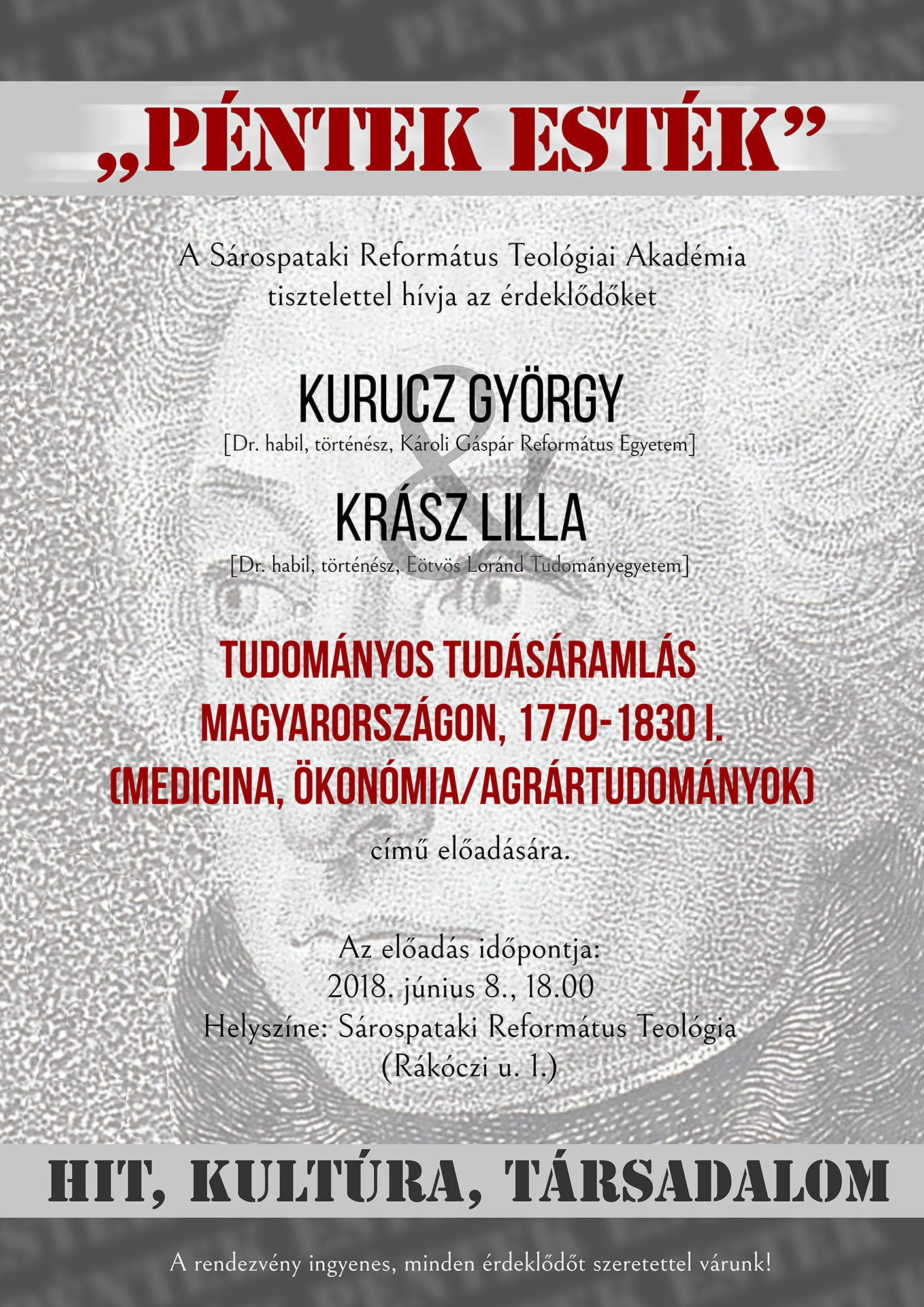 Lilla Krász and György Kurucz held an introductory lecture about the transfers of knowledge within the disciplines of medicine, economics, and the agrarian sciences in the long eighteenth century. The event was organised by The Reformed Theology Academy of Sárospatak as part of the lecture series Friday Nights.
Lilla Krász and György Kurucz held an introductory lecture about the transfers of knowledge within the disciplines of medicine, economics, and the agrarian sciences in the long eighteenth century. The event was organised by The Reformed Theology Academy of Sárospatak as part of the lecture series Friday Nights.
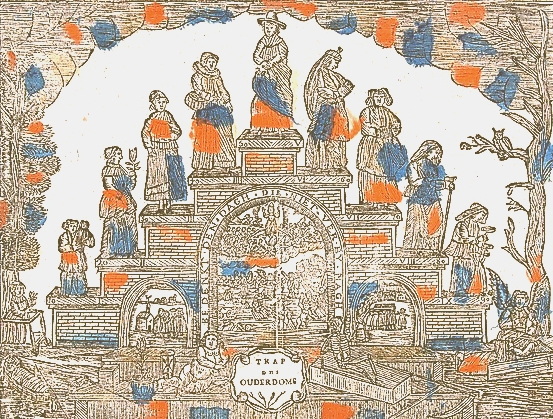 The Research Centre for Women’s History, Eötvös Loránd University, the Department of European and Comparative Literature and Language Studies of the University of Vienna and the Institute of History of the Slovakian Academy of Sciences organised a two-day international workshop between 21–23 May 2018 on the cultural history of female communication in the Habsburg Monarchy. The participants of the workshop discussed the social and cultural history of female learning, education, and communication. Our project leader, Lilla Krász participated in the event and gave a presentation about the anthropology of the personal description of ‘escaped women’ in the Kingdom of Hungary in the eighteenth century.
The Research Centre for Women’s History, Eötvös Loránd University, the Department of European and Comparative Literature and Language Studies of the University of Vienna and the Institute of History of the Slovakian Academy of Sciences organised a two-day international workshop between 21–23 May 2018 on the cultural history of female communication in the Habsburg Monarchy. The participants of the workshop discussed the social and cultural history of female learning, education, and communication. Our project leader, Lilla Krász participated in the event and gave a presentation about the anthropology of the personal description of ‘escaped women’ in the Kingdom of Hungary in the eighteenth century.
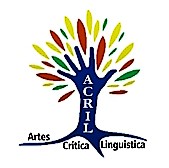 The Artes CRItica Linguistica (ACRIL) and the French Connection – Comparative Cultural Studies Research Group organised a conference on 17–18 May 2018 on travel and spirituality in Neo-Latin and Classical cultures. On the first day of the conference, two of our colleagues, Ildikó Sz. Kristóf and Piroska Balogh gave presentations. Ildikó Sz. Kristóf spoke about the discovery of the Americas in seventeenth-century Hungary, whereas Piroska Balogh discussed the issues of travel and spirituality in József Eötvös’s novel, The Carthusians.
The Artes CRItica Linguistica (ACRIL) and the French Connection – Comparative Cultural Studies Research Group organised a conference on 17–18 May 2018 on travel and spirituality in Neo-Latin and Classical cultures. On the first day of the conference, two of our colleagues, Ildikó Sz. Kristóf and Piroska Balogh gave presentations. Ildikó Sz. Kristóf spoke about the discovery of the Americas in seventeenth-century Hungary, whereas Piroska Balogh discussed the issues of travel and spirituality in József Eötvös’s novel, The Carthusians.
The methodological problems of writing intellectual history and the history of philosophy in Hungary
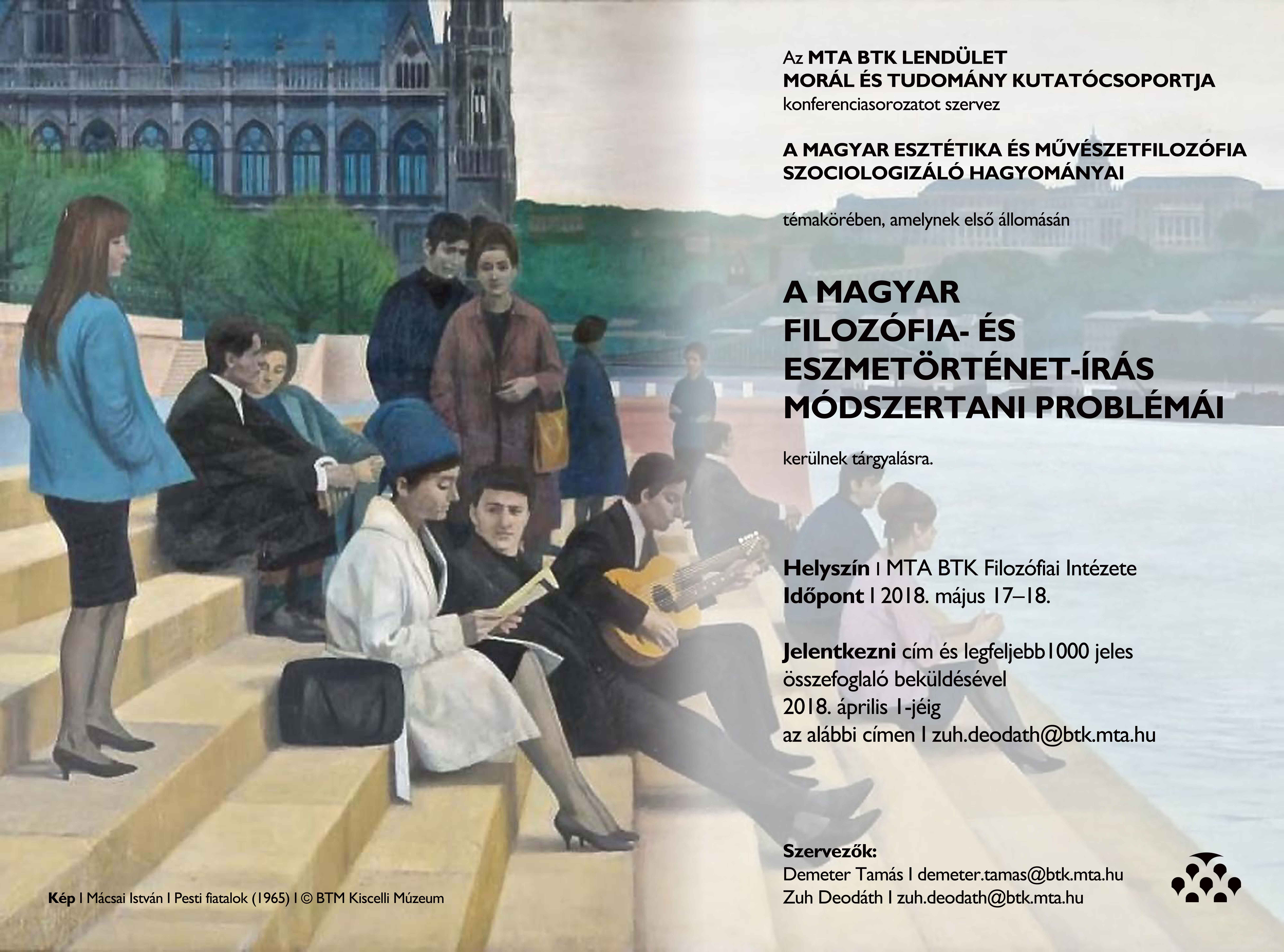 The ‘Momentum’ Morals and Science Research Group of the Research Centre for the Humanities of the Hungarian Academy of Sciences organised a conference on 17–18 May 2018 on the methodological problems of writing intellectual history and the history of philosophy in Hungary. Our colleague, Piroska Balogh participated in the event and spoke about the tradition and research methodology of ‘university aesthetics’ in Hungary.
The ‘Momentum’ Morals and Science Research Group of the Research Centre for the Humanities of the Hungarian Academy of Sciences organised a conference on 17–18 May 2018 on the methodological problems of writing intellectual history and the history of philosophy in Hungary. Our colleague, Piroska Balogh participated in the event and spoke about the tradition and research methodology of ‘university aesthetics’ in Hungary.
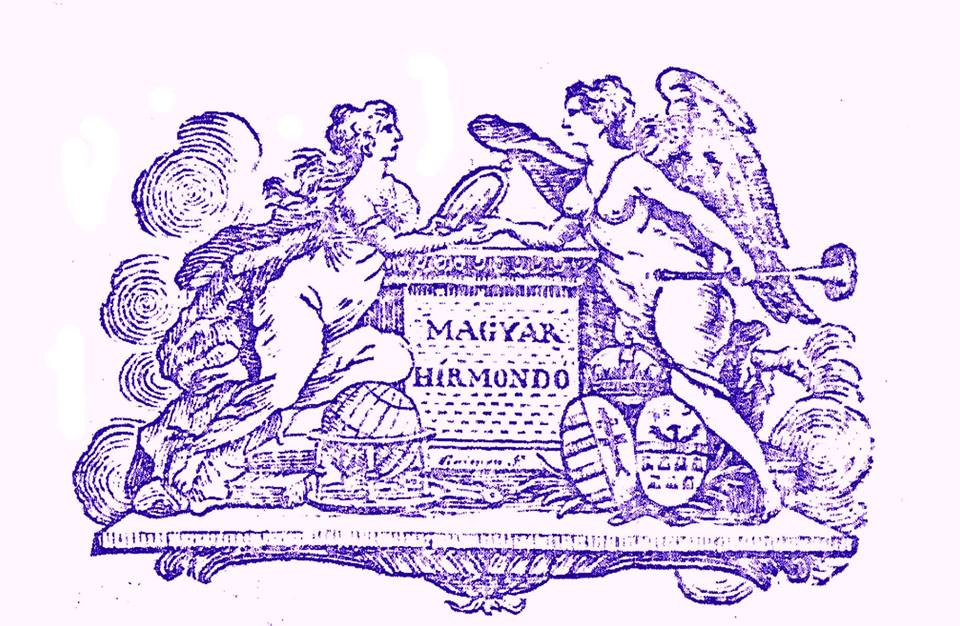 On 25–27 April 2018, the Theological College of Győr and the ‘Momentum’ Western Hungarian Literature (1770–1820) Research Group of the Research Centre for the Humanities of the Hungarian Academy of Sciences organised a conference on the press and literature of multilingual Hungary between 1770 and 1820. Our colleague, Piroska Balogh gave a presentation at the conference on the Hungarian critical tradition and Lajos János Schedius’s Literärischer Anzeiger.
On 25–27 April 2018, the Theological College of Győr and the ‘Momentum’ Western Hungarian Literature (1770–1820) Research Group of the Research Centre for the Humanities of the Hungarian Academy of Sciences organised a conference on the press and literature of multilingual Hungary between 1770 and 1820. Our colleague, Piroska Balogh gave a presentation at the conference on the Hungarian critical tradition and Lajos János Schedius’s Literärischer Anzeiger.
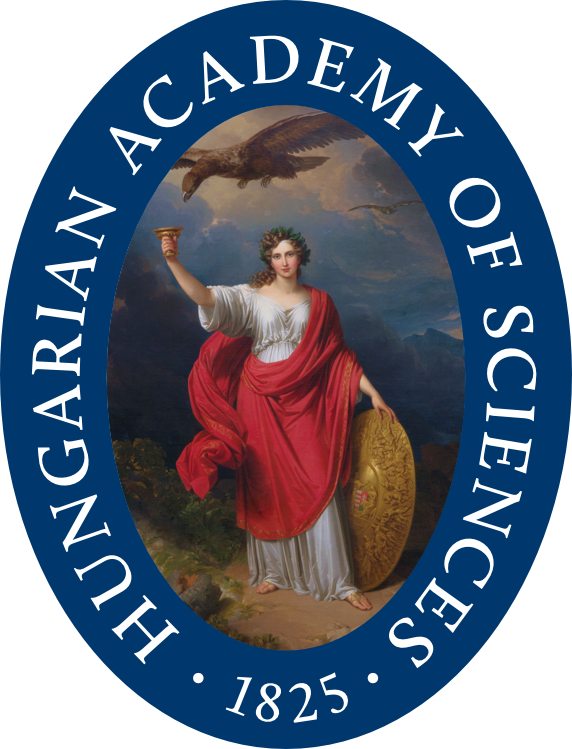 The Complex Committee on the History of Science and Technology of the Hungarian Academy of Sciences organised a conference on 20 April 2018 on Measuring the Third Kingdom of Nature – The Influence of Abraham Gottlob Werner on the Disciplinarization of Mineralogy. Dezső Gurka participated in the event and gave a talk on Werner’s impact in Hungary.
The Complex Committee on the History of Science and Technology of the Hungarian Academy of Sciences organised a conference on 20 April 2018 on Measuring the Third Kingdom of Nature – The Influence of Abraham Gottlob Werner on the Disciplinarization of Mineralogy. Dezső Gurka participated in the event and gave a talk on Werner’s impact in Hungary.
 As part of the INTERCO-SSH European project, the John Wesley Theological College organised a conference on 22 February 2018 on Hungarian ethnography and cultural anthropology in the Millennium. Our colleague, Ildikó Sz. Kristóf gave a lecture on cultural anthropology, microhistory, discursivity, and the approaches of scientific debates between 1985 and 2010.
As part of the INTERCO-SSH European project, the John Wesley Theological College organised a conference on 22 February 2018 on Hungarian ethnography and cultural anthropology in the Millennium. Our colleague, Ildikó Sz. Kristóf gave a lecture on cultural anthropology, microhistory, discursivity, and the approaches of scientific debates between 1985 and 2010.
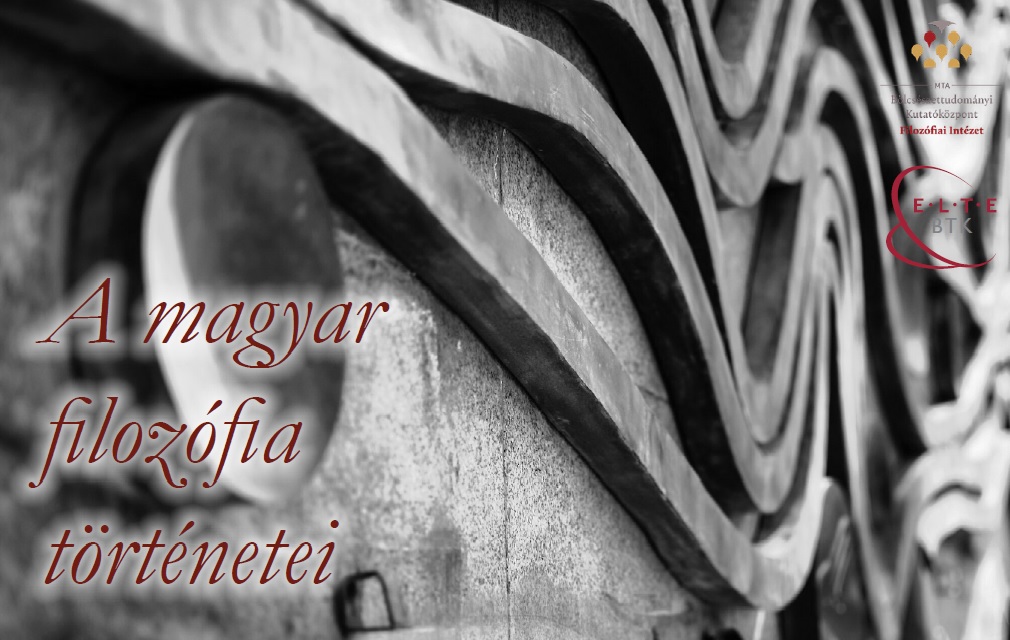 The Institute of Philosophy of the Hungarian Academy of Sciences and the Institute of Philosophy of the Faculty of Humanities, Eötvös Loránd University organised a conference on the histories of Hungarian philosophy on 8–9 February 2018. Our colleague, Dezső Gurka gave a presentation about the Hungarian aspects of the Jena Constellation at the turn of the eighteenth and nineteenth centuries.
The Institute of Philosophy of the Hungarian Academy of Sciences and the Institute of Philosophy of the Faculty of Humanities, Eötvös Loránd University organised a conference on the histories of Hungarian philosophy on 8–9 February 2018. Our colleague, Dezső Gurka gave a presentation about the Hungarian aspects of the Jena Constellation at the turn of the eighteenth and nineteenth centuries.
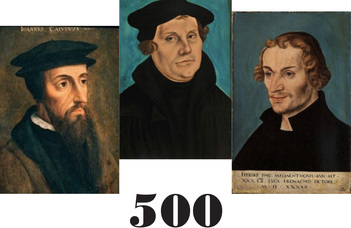 Between 4–7 December 2017, the University of Prešov, the Charles University of Prague, the Eötvös Loránd University and other Hungarian and Slovakian history departments organised an international conference in Prešov, Slovakia to celebrate the 500th anniversary of the Reformation. Our colleague, György Kurucz presented a paper on the relationship of the Georgia Augusta University of Göttingen and Hungarian agricultural training at the turn of the eighteenth and nineteenth centuries.
Between 4–7 December 2017, the University of Prešov, the Charles University of Prague, the Eötvös Loránd University and other Hungarian and Slovakian history departments organised an international conference in Prešov, Slovakia to celebrate the 500th anniversary of the Reformation. Our colleague, György Kurucz presented a paper on the relationship of the Georgia Augusta University of Göttingen and Hungarian agricultural training at the turn of the eighteenth and nineteenth centuries.
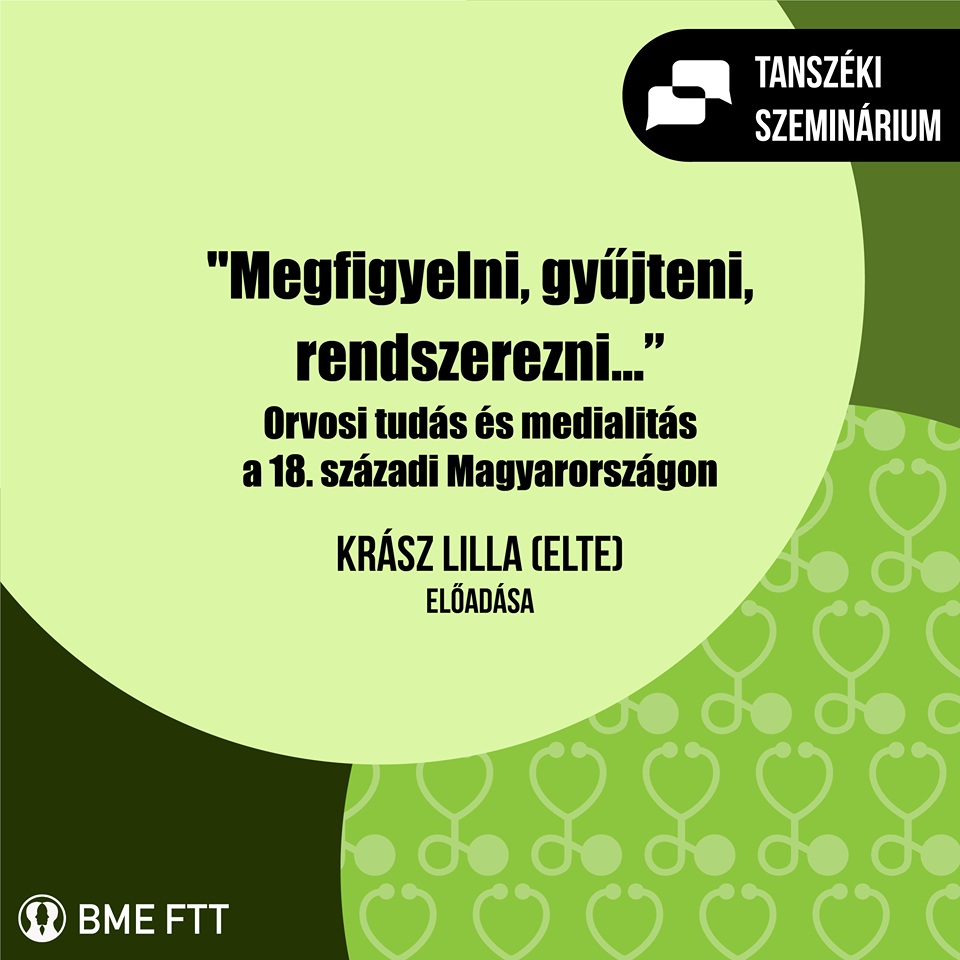 On 4 December 2017, our project leader, Lilla Krász gave a lecture on the theory and practice of the organisation of medical knowledge in eighteennth-century Hungary at the Department of Philosophy and the History of Science of the Budapest University of Technology and Economics.
On 4 December 2017, our project leader, Lilla Krász gave a lecture on the theory and practice of the organisation of medical knowledge in eighteennth-century Hungary at the Department of Philosophy and the History of Science of the Budapest University of Technology and Economics.
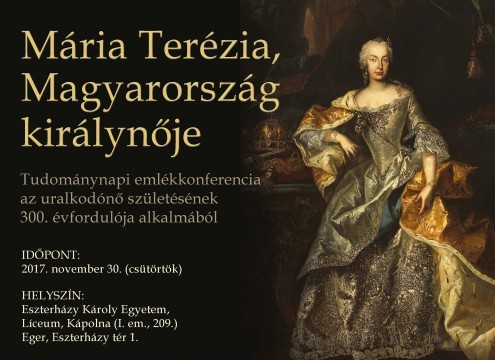 The Institute of History, Esterházy Károly University and the Heves County Committee of the Hungarian Historical Society organised a conference on Maria Theresa, the Queen of Hungary on 30 November 2017 in Eger. At the conference, our project leader, Lilla Krász gave a presentation about the medical profession in Hungary during the reign of Maria Theresa.
The Institute of History, Esterházy Károly University and the Heves County Committee of the Hungarian Historical Society organised a conference on Maria Theresa, the Queen of Hungary on 30 November 2017 in Eger. At the conference, our project leader, Lilla Krász gave a presentation about the medical profession in Hungary during the reign of Maria Theresa.
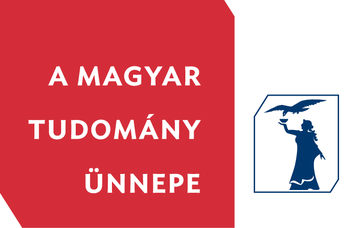 As part of a series of events for the Celebration of Hungarian Science, the Research Centre for Women’s History, Eötvös Loránd University organised a conference on 17 November 2017, where the members of the research group presented and discussed their new findings. Our project leader, Lilla Krász participated in the event and discussed midwifery and/or obstetrics – the ‘science’ of women and men of women in the eighteenth century.
As part of a series of events for the Celebration of Hungarian Science, the Research Centre for Women’s History, Eötvös Loránd University organised a conference on 17 November 2017, where the members of the research group presented and discussed their new findings. Our project leader, Lilla Krász participated in the event and discussed midwifery and/or obstetrics – the ‘science’ of women and men of women in the eighteenth century.
 The Institute of English and American Studies and the Department of Hispanic Studies of the University of Szeged organised an international conference on 16 November 2017. The newly formed Inter-American Research Centre was also introduced at the event. Our colleague, Ildikó Sz. Kristóf gave a presentation at the conference on discovering the Americas in early modern Hungary.
The Institute of English and American Studies and the Department of Hispanic Studies of the University of Szeged organised an international conference on 16 November 2017. The newly formed Inter-American Research Centre was also introduced at the event. Our colleague, Ildikó Sz. Kristóf gave a presentation at the conference on discovering the Americas in early modern Hungary.
 As part of the János Arany Memorial Year, the Department of 18th–19th-Century Hungarian Literature, Faculty of Humanities, Eötvös Loránd University and the Hungarian Literary Society organised a conference on 10 November 2017. Our colleague, Piroska Balogh gave a presentation about the possible interpretations of János Arany’s Notes on Aesthetics (Széptani jegyzetek).
As part of the János Arany Memorial Year, the Department of 18th–19th-Century Hungarian Literature, Faculty of Humanities, Eötvös Loránd University and the Hungarian Literary Society organised a conference on 10 November 2017. Our colleague, Piroska Balogh gave a presentation about the possible interpretations of János Arany’s Notes on Aesthetics (Széptani jegyzetek).
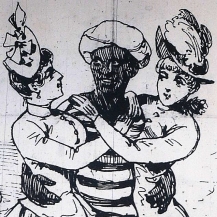 The Institute of Archaeology and Ethnology of the Polish Academy of Sciences organised an international conference on 25 October 2017 on Staged Otherness: Human Oddities in Central and Eastern Europe, c. 1850–1939. Ildikó Sz. Kristóf participated in the event and gave a presentation about Buffalo Bill’s Wild West Show in Hungary and its Ethnographical Contexts.
The Institute of Archaeology and Ethnology of the Polish Academy of Sciences organised an international conference on 25 October 2017 on Staged Otherness: Human Oddities in Central and Eastern Europe, c. 1850–1939. Ildikó Sz. Kristóf participated in the event and gave a presentation about Buffalo Bill’s Wild West Show in Hungary and its Ethnographical Contexts.
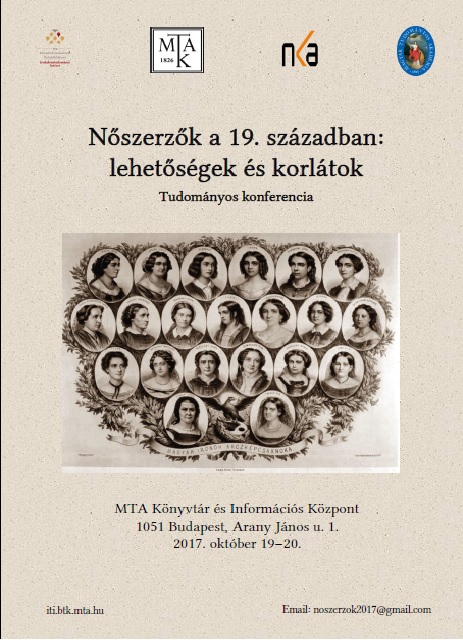 On 19–20 October 2017, the Institute for Literary Studies of the Hungarian Academy of Sciences and the Committee for Women’s History of the Hungarian Academy of Sciences organised a two-day conference on the possibilities and limitations of female authors in the nineteenth century. At the conference, Piroska Balogh discussed the question, whether we can speak of a ‘female aesthetics’ in the context of eighteenth- and nineteenth-century Hungary.
On 19–20 October 2017, the Institute for Literary Studies of the Hungarian Academy of Sciences and the Committee for Women’s History of the Hungarian Academy of Sciences organised a two-day conference on the possibilities and limitations of female authors in the nineteenth century. At the conference, Piroska Balogh discussed the question, whether we can speak of a ‘female aesthetics’ in the context of eighteenth- and nineteenth-century Hungary.
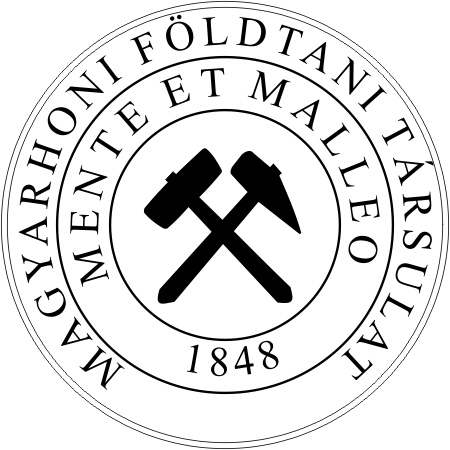 Dezső Gurka gave a talk at the lecture session of the Mineralogy and Geochemistry Department of the Hungarian Geological Society on 16 October 2017 about the impact of Abraham Gottlob Werner’s work in eighteeth- and nineteenth-century Hungary.
Dezső Gurka gave a talk at the lecture session of the Mineralogy and Geochemistry Department of the Hungarian Geological Society on 16 October 2017 about the impact of Abraham Gottlob Werner’s work in eighteeth- and nineteenth-century Hungary.
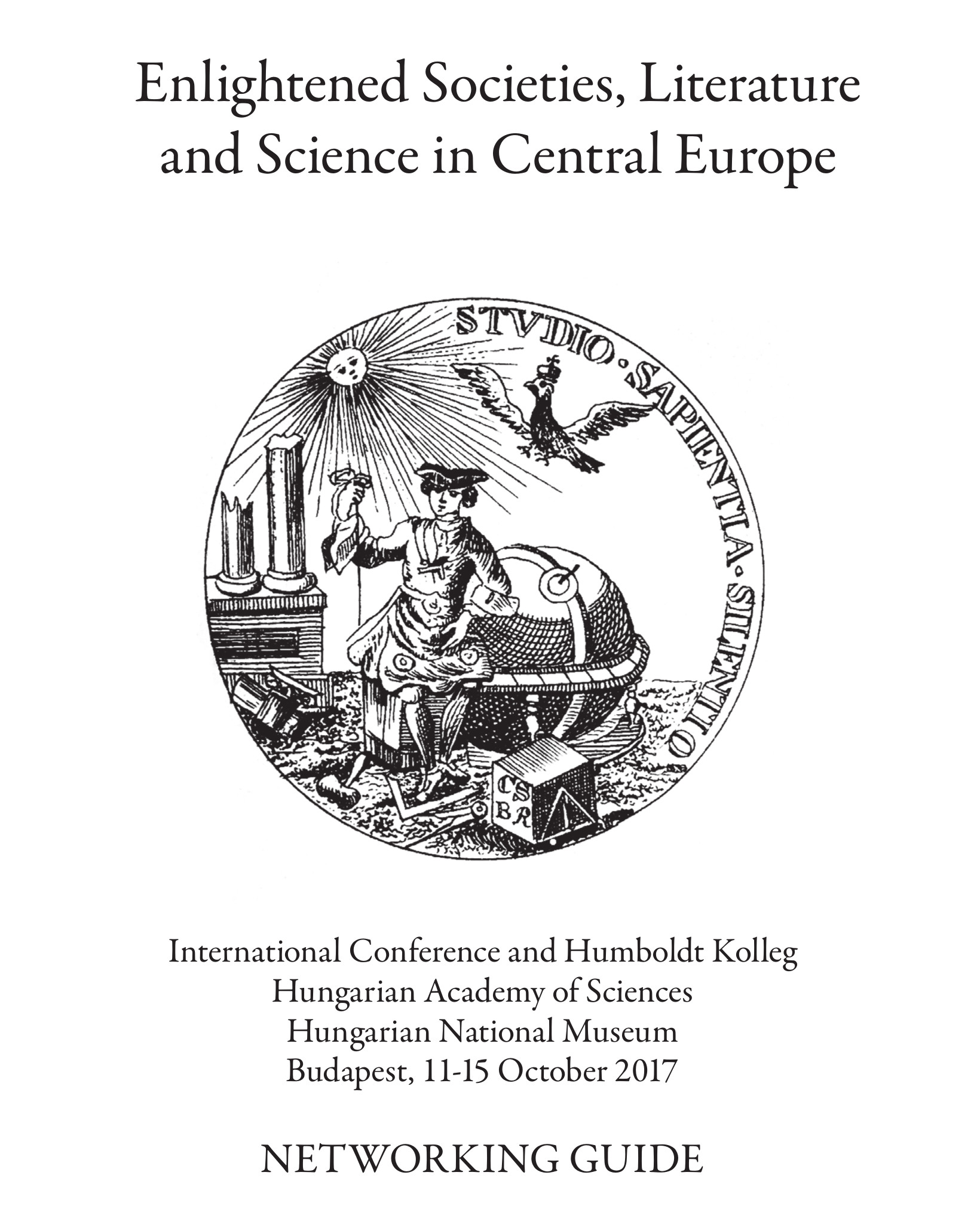 The Hungarian Academy of Sciences and the Hungarian National Museum organised an international conference in Budapest between 11–15 October 2017. The symposium focused on the literature, the sciences and the societies of the Age of Enlightenment. Our colleague, Piroska Balogh participated in the event and gave a presentation about the constitution and operation of the Draskovich Observance.
The Hungarian Academy of Sciences and the Hungarian National Museum organised an international conference in Budapest between 11–15 October 2017. The symposium focused on the literature, the sciences and the societies of the Age of Enlightenment. Our colleague, Piroska Balogh participated in the event and gave a presentation about the constitution and operation of the Draskovich Observance.
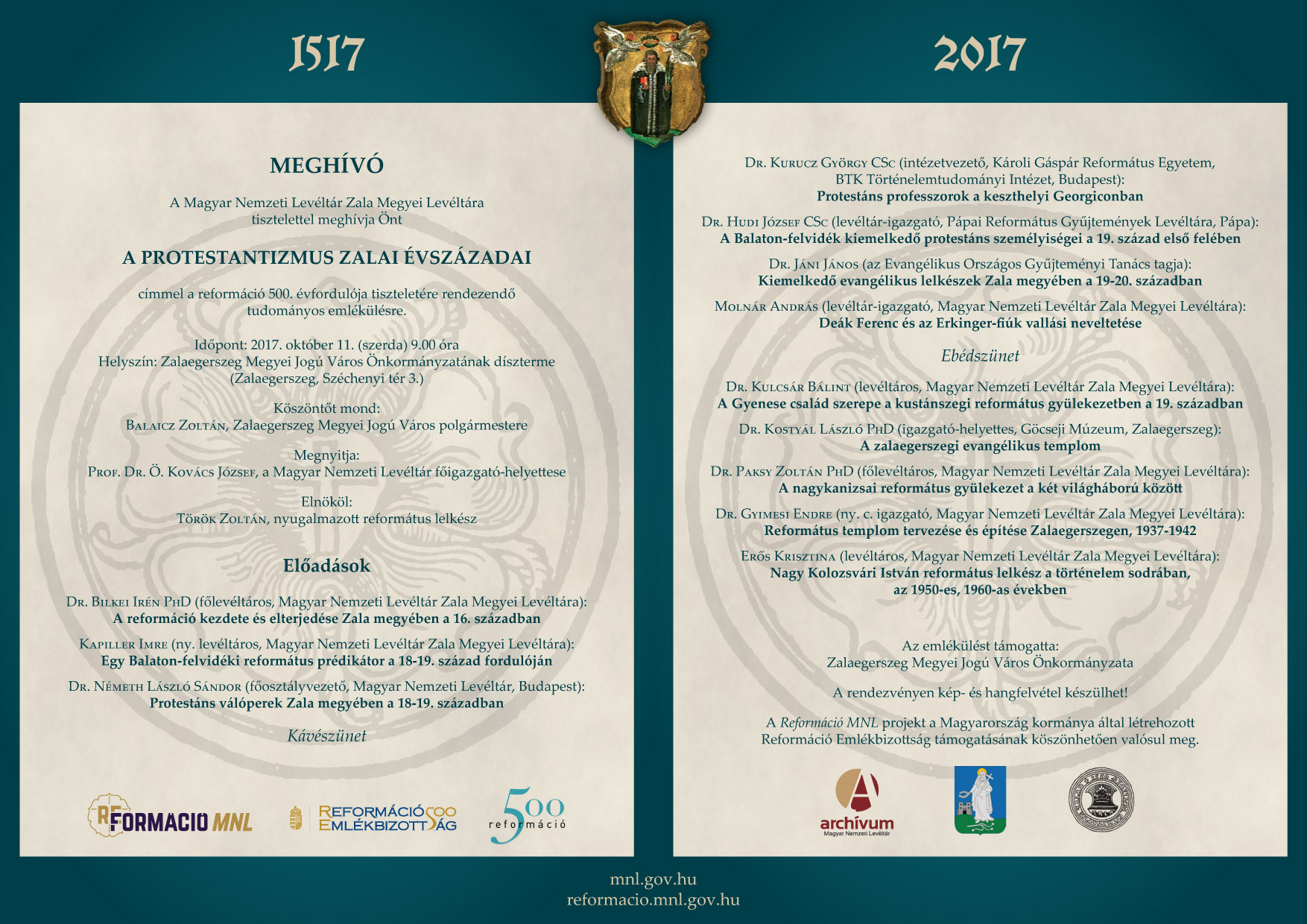 On 11 October 2017, the Zala County Archives of the Hungarian National Archives organised a conference on the centuries of Protestantism in Zala County to celebrate the 500th anniversary of the Reformation. At the conference, our colleague, György Kurucz presented a paper on the protestant professors of the Georgicon in Keszthely.
On 11 October 2017, the Zala County Archives of the Hungarian National Archives organised a conference on the centuries of Protestantism in Zala County to celebrate the 500th anniversary of the Reformation. At the conference, our colleague, György Kurucz presented a paper on the protestant professors of the Georgicon in Keszthely.
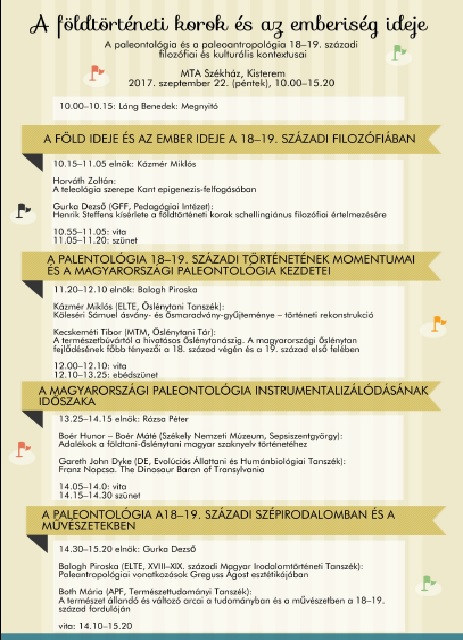 The Complex Committee on the History of Science and Technology organised a conference on 22 September 2017 on the Geological Periods and the Time of Humankind. Two members of our project team discussed their findings at the conference. Dezső Gurka presented a paper on Henrik Steffens’s attempt at the Schellingian interpretation of the geological periods, whereas Piroska Balogh discussed the paleoanthropological aspects of Ágost Greguss’s aesthetics.
The Complex Committee on the History of Science and Technology organised a conference on 22 September 2017 on the Geological Periods and the Time of Humankind. Two members of our project team discussed their findings at the conference. Dezső Gurka presented a paper on Henrik Steffens’s attempt at the Schellingian interpretation of the geological periods, whereas Piroska Balogh discussed the paleoanthropological aspects of Ágost Greguss’s aesthetics.
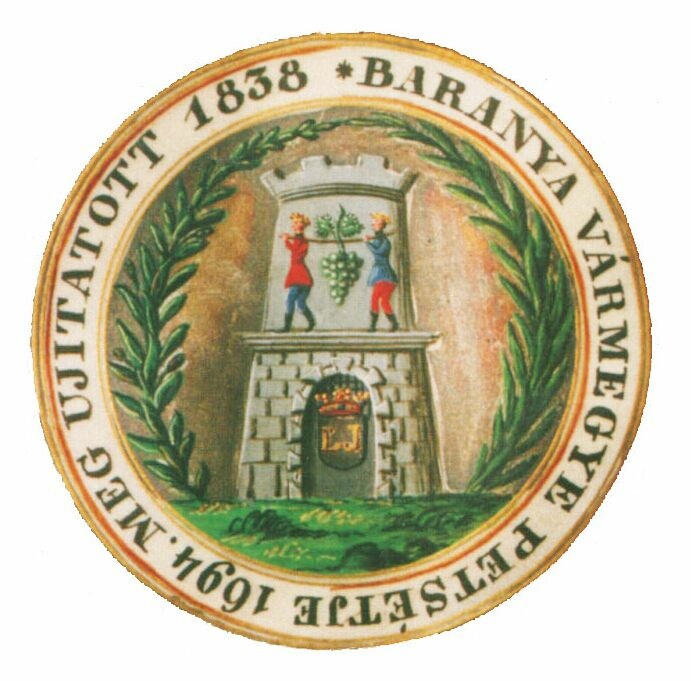 The Békés County Archives organised a conference on 14 September 2017 to celebrate the 500th anniversary of the Reformation. Our colleague, György Kurucz participated in the event and gave a presentation about the impact of the Georgia Augusta University of Göttingen in Hungary in the second half of the eighteenth century.
The Békés County Archives organised a conference on 14 September 2017 to celebrate the 500th anniversary of the Reformation. Our colleague, György Kurucz participated in the event and gave a presentation about the impact of the Georgia Augusta University of Göttingen in Hungary in the second half of the eighteenth century.
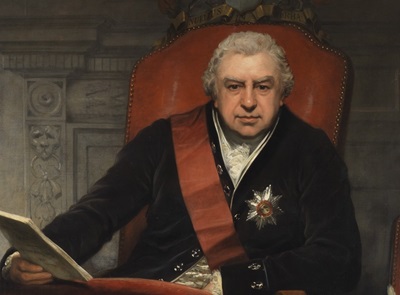 The Royal Society organised a conference on Joseph Banks in London between 14–15 September 2017. Our colleague, Ildikó Sz. Kristóf participated in the event.
The Royal Society organised a conference on Joseph Banks in London between 14–15 September 2017. Our colleague, Ildikó Sz. Kristóf participated in the event.
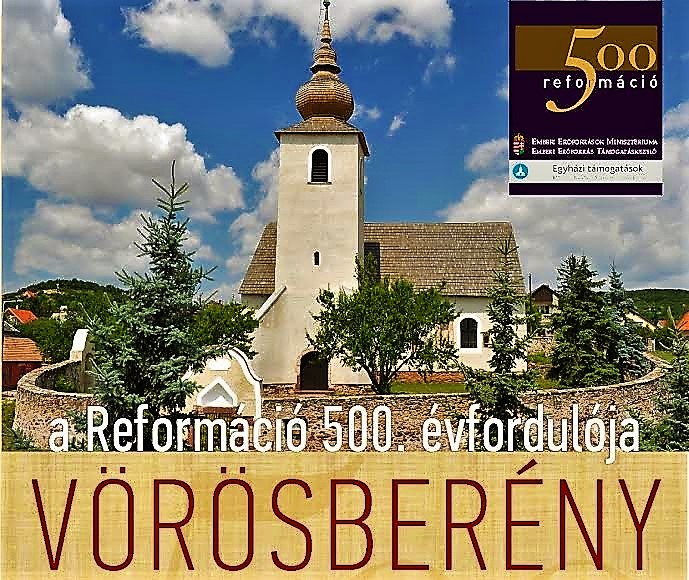 To celebrate the 500th anniversary of the Reformation, a three-day memorial meeting was held in Vörösberény between 11–13 August 2017. Our project leader, Lilla Krász gave a presentation about Protestantism, science, and the medical profession in eighteenth-century Hungary. The panel session was led by our colleague, György Kurucz.
To celebrate the 500th anniversary of the Reformation, a three-day memorial meeting was held in Vörösberény between 11–13 August 2017. Our project leader, Lilla Krász gave a presentation about Protestantism, science, and the medical profession in eighteenth-century Hungary. The panel session was led by our colleague, György Kurucz.
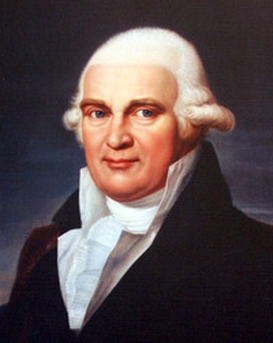 Between 29 June – 1 July 2017, a three-day symposium was held at the University of Freiberg to commemorate the German geologist and mineral collector, Abraham Gottlob Werner (1750–1817). Dezső Gurka participated in the event and gave a talk about the impact of Abraham Gottlob Werner in Hungary.
Between 29 June – 1 July 2017, a three-day symposium was held at the University of Freiberg to commemorate the German geologist and mineral collector, Abraham Gottlob Werner (1750–1817). Dezső Gurka participated in the event and gave a talk about the impact of Abraham Gottlob Werner in Hungary.
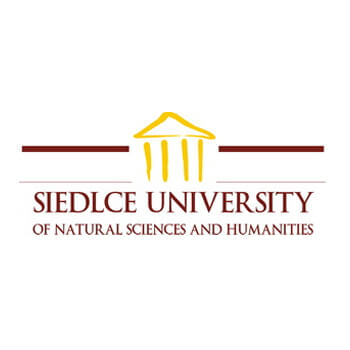 The 15th international Conference on Pedagogy (Orientations and Ventures in Education) was organised in Siedlce, Poland between 23–25 May 2017, where our colleague, Dezső Gurka gave a presentation about the Polish–Hungarian relations in the teaching programme of the College of Education at Szarvas.
The 15th international Conference on Pedagogy (Orientations and Ventures in Education) was organised in Siedlce, Poland between 23–25 May 2017, where our colleague, Dezső Gurka gave a presentation about the Polish–Hungarian relations in the teaching programme of the College of Education at Szarvas.
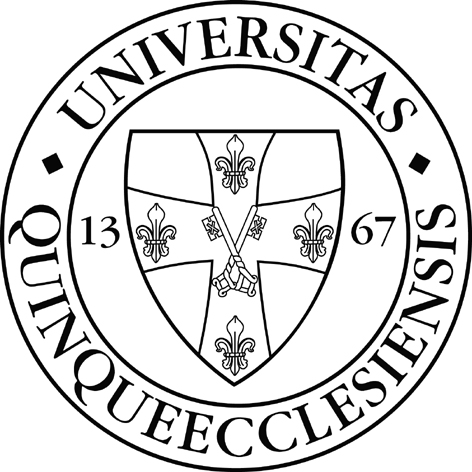 The University of Pécs organised a conference on 6 May 2017 on the roles and opportunities of Central European universities in the transformation of European cultural history. Our colleague, Piroska Balogh participated in the event and she spoke about the theories and educational programme of Friedrich August Werthesas, professor of aesthetics at the University of Pest.
The University of Pécs organised a conference on 6 May 2017 on the roles and opportunities of Central European universities in the transformation of European cultural history. Our colleague, Piroska Balogh participated in the event and she spoke about the theories and educational programme of Friedrich August Werthesas, professor of aesthetics at the University of Pest.
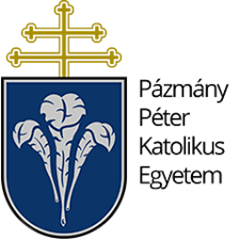 Our project leader, Lilla Krász held a master course in the Doctoral School of History, Pázmány Péter Catholic University on 2 May 2017. In her lecture, she discussed the questions of medical science and knowledge transfers in the Habsburg Monarchy in the eighteenth century.
Our project leader, Lilla Krász held a master course in the Doctoral School of History, Pázmány Péter Catholic University on 2 May 2017. In her lecture, she discussed the questions of medical science and knowledge transfers in the Habsburg Monarchy in the eighteenth century.
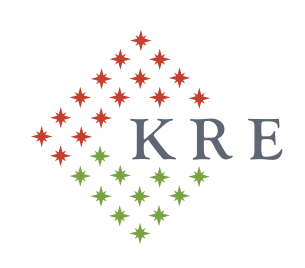 The Károli Gáspár University of the Reformed Church in Hungary organised a conference on 5 April 2017 on National Identity and Modernity between 1870 and 1945. The participants of the conference focused on three peripheral regions (Latin America, Southern Europe, East-Central Europe) in the context of the social sciences, literature, and the arts. Our colleague, Ildikó Sz. Kristóf gave a presentation on Alexander von Humboldt and Hungary, and the issues of national identity and the emergence of modern sciences.
The Károli Gáspár University of the Reformed Church in Hungary organised a conference on 5 April 2017 on National Identity and Modernity between 1870 and 1945. The participants of the conference focused on three peripheral regions (Latin America, Southern Europe, East-Central Europe) in the context of the social sciences, literature, and the arts. Our colleague, Ildikó Sz. Kristóf gave a presentation on Alexander von Humboldt and Hungary, and the issues of national identity and the emergence of modern sciences.
 The Research Group for the Cultural History of the Reformation at the Faculty of Humanities, Károli Gáspár University of the Reformed Church in Hungary organised a conference on 13 March 2017 to celebrate the 500th anniversary of the Reformation. At the event, our colleague, György Kurucz spoke about the power of the state, economic development, and the impact of eighteenth-century Western European scientific centres on Hungary.
The Research Group for the Cultural History of the Reformation at the Faculty of Humanities, Károli Gáspár University of the Reformed Church in Hungary organised a conference on 13 March 2017 to celebrate the 500th anniversary of the Reformation. At the event, our colleague, György Kurucz spoke about the power of the state, economic development, and the impact of eighteenth-century Western European scientific centres on Hungary.
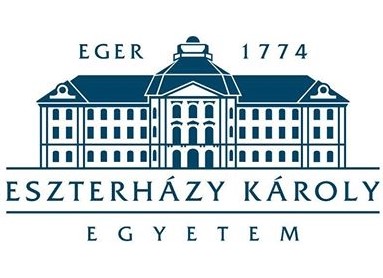 The Institute of History, Esterházy University of Eger organised a conference on 7–8 March 2017, where the early modern and modern aspects of the connections between private and public interests were discussed. Two of our colleagues participated in the event. Lilla Krász gave a presentation about the medical profession in eighteenth-century Hungary in the web of private and public interests, whereas György Kurucz spoke about the unity of private and public interests in the scientific and cultural pursuits of the Festetics family.
The Institute of History, Esterházy University of Eger organised a conference on 7–8 March 2017, where the early modern and modern aspects of the connections between private and public interests were discussed. Two of our colleagues participated in the event. Lilla Krász gave a presentation about the medical profession in eighteenth-century Hungary in the web of private and public interests, whereas György Kurucz spoke about the unity of private and public interests in the scientific and cultural pursuits of the Festetics family.
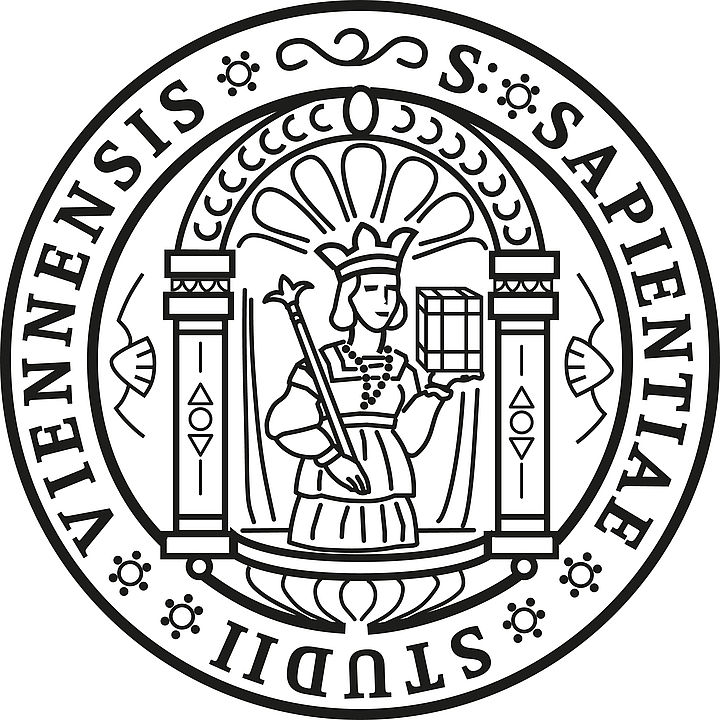 On 22 February 2017, the Institute for Cultural and Social Anthropology of the University of Vienna organised a workshop on the Representations of Indigenous Peoples of the Asian Peripheries of the Russian Empire (Northern and Inner Asia) in the Legacies of Travellers from Austro-Hungary. Our colleague, Ildikó Sz. Kristóf participated in the event, and discussed the emergence, agents and sources of world ethnography in Hungary before 1848 in her presentation.
On 22 February 2017, the Institute for Cultural and Social Anthropology of the University of Vienna organised a workshop on the Representations of Indigenous Peoples of the Asian Peripheries of the Russian Empire (Northern and Inner Asia) in the Legacies of Travellers from Austro-Hungary. Our colleague, Ildikó Sz. Kristóf participated in the event, and discussed the emergence, agents and sources of world ethnography in Hungary before 1848 in her presentation.
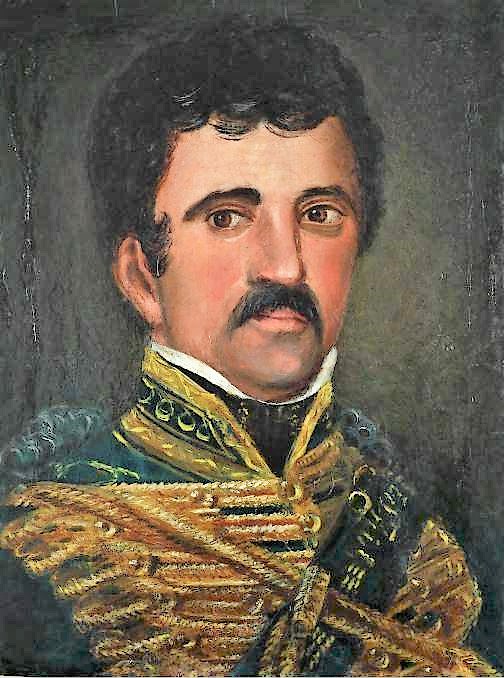 To commemorate the 300th anniversary of Miklós Bethlen’s death, the Department of Early Modern Hungarian History, the Department of Medieval and Renaissance Hungarian Literature, Faculty of Humanities, Eötvös Loránd University, and the OTKA Research Group Representation and Material Culture in the Seventeenth-century Court of Transylvanian Princes organised a conference between 16–18 November 2016. Two of our colleagues participated in the event. Piroska Balogh discussed the poetics of space and body writing in the Autobiography of Miklós Bethlen, whereas Lilla Krász discussed Miklós Bethlen’s attitude towards medicine, health, and sickness.
To commemorate the 300th anniversary of Miklós Bethlen’s death, the Department of Early Modern Hungarian History, the Department of Medieval and Renaissance Hungarian Literature, Faculty of Humanities, Eötvös Loránd University, and the OTKA Research Group Representation and Material Culture in the Seventeenth-century Court of Transylvanian Princes organised a conference between 16–18 November 2016. Two of our colleagues participated in the event. Piroska Balogh discussed the poetics of space and body writing in the Autobiography of Miklós Bethlen, whereas Lilla Krász discussed Miklós Bethlen’s attitude towards medicine, health, and sickness.
 The Section of Linguistics and Literary Scholarship, the Section of Philosophy and Historical Sciences, and the Section of Economics and Law of the Hungarian Academy of Sciences organised a conference on 9 November 2016 to celebrate the Day of Hungarian Science. The conference programme focused on the issues of cultural heritage, the sites of memory, and the history of memory. Our colleague, Ildikó Sz. Kristóf gave a presentation on the role of memory in the canon formation of the early sources of cultural anthropology at the turn of the eighteenth and nineteenth centuries.
The Section of Linguistics and Literary Scholarship, the Section of Philosophy and Historical Sciences, and the Section of Economics and Law of the Hungarian Academy of Sciences organised a conference on 9 November 2016 to celebrate the Day of Hungarian Science. The conference programme focused on the issues of cultural heritage, the sites of memory, and the history of memory. Our colleague, Ildikó Sz. Kristóf gave a presentation on the role of memory in the canon formation of the early sources of cultural anthropology at the turn of the eighteenth and nineteenth centuries.
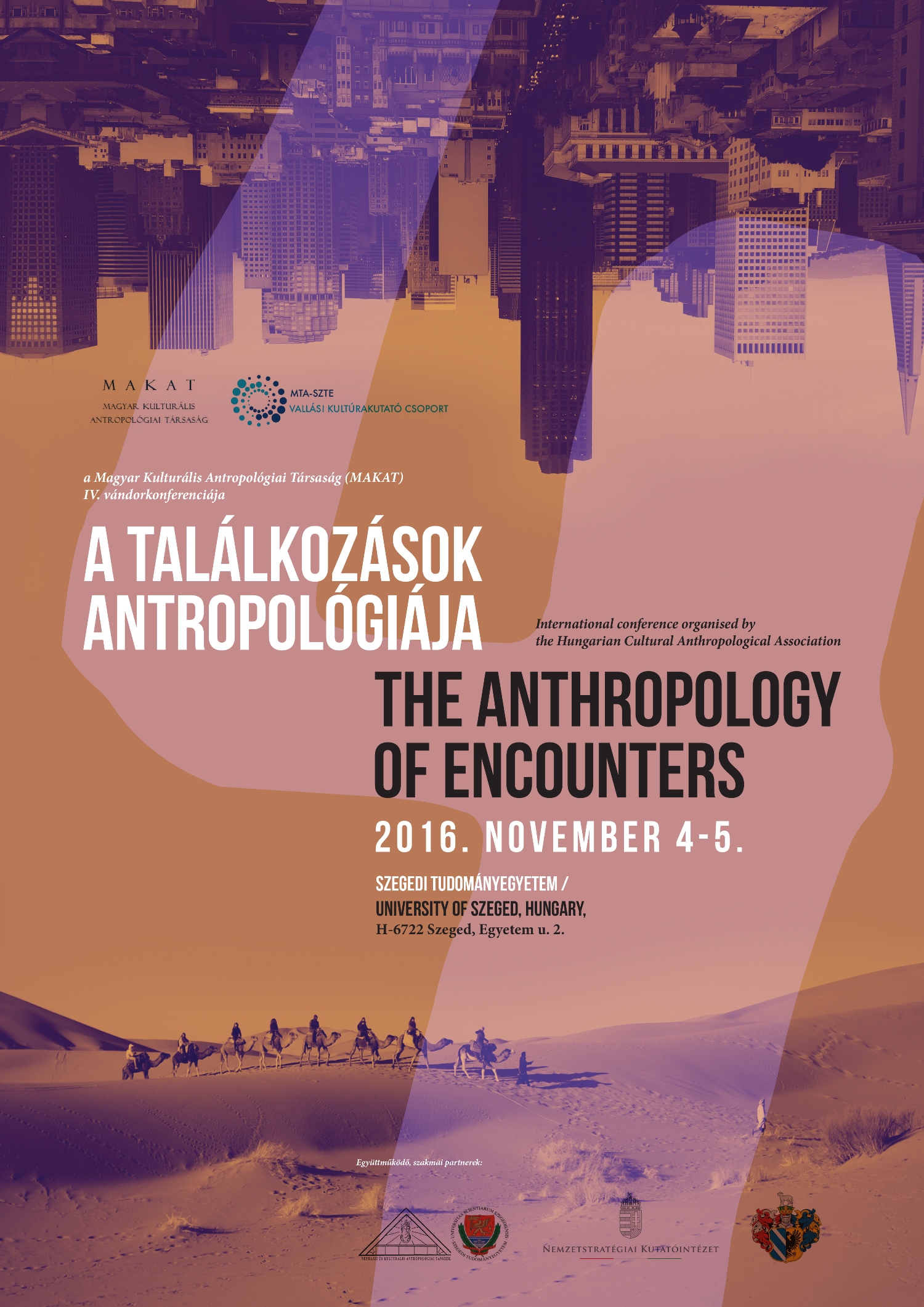 On 5 November 2016, the Hungarian Cultural Anthropology Association organised a conference on the anthropology of encounters in Szeged. Our colleague, Ildikó Sz. Kristóf chaired a session on the encounters inside and outside of Europe and gave a lecture about Aby Warburg and the unknown Indian, the reflections of anthropology and other disciplines on the history of a cultural encounter.
On 5 November 2016, the Hungarian Cultural Anthropology Association organised a conference on the anthropology of encounters in Szeged. Our colleague, Ildikó Sz. Kristóf chaired a session on the encounters inside and outside of Europe and gave a lecture about Aby Warburg and the unknown Indian, the reflections of anthropology and other disciplines on the history of a cultural encounter.
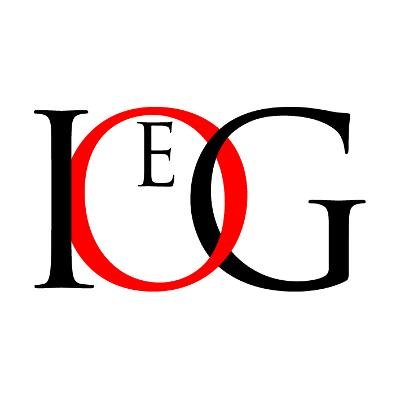 On 17 October 2016, the leader of our project, Lilla Krász held a lecture at the Institute for Austrian Historical Research (Institute für Österreichische Geschichstforschung) at the University of Vienna on the organisation of medical knowledge in the Kingdom of Hungary in the Age of Enlightenment.
On 17 October 2016, the leader of our project, Lilla Krász held a lecture at the Institute for Austrian Historical Research (Institute für Österreichische Geschichstforschung) at the University of Vienna on the organisation of medical knowledge in the Kingdom of Hungary in the Age of Enlightenment.
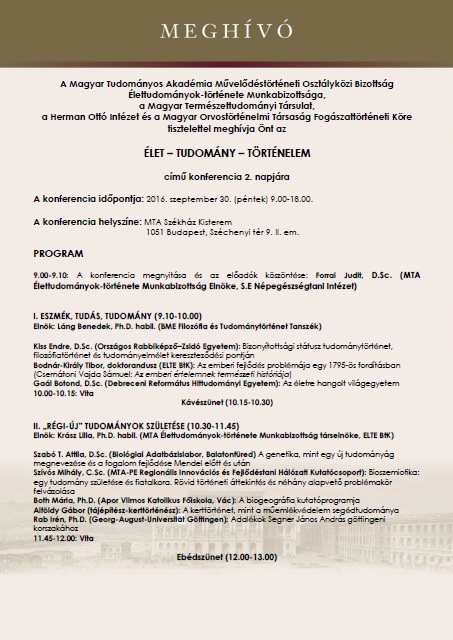 The Sub-Committee on the History of Life Sciences of the Committee on Cultural History of the Hungarian Academy of Sciences, the Hungarian Society of Natural Sciences, the Ottó Herman Institute, and the Company of Dental History of the Hungarian Society for the History of Medicine organised a two-day conference on the history of life sciences. On 30 September, our colleagues, Tibor Bodnár-Király and Lilla Krász gave presentations on The Problems of Human Progression in Sámuel Csernatoni Vajda’s Translation of Karl Friedrich Flögel’s Geschichte des menschlichen Verstandes and Medical Knowledge and Mediality in the Eighteenth-century Habsburg Monarchy.
The Sub-Committee on the History of Life Sciences of the Committee on Cultural History of the Hungarian Academy of Sciences, the Hungarian Society of Natural Sciences, the Ottó Herman Institute, and the Company of Dental History of the Hungarian Society for the History of Medicine organised a two-day conference on the history of life sciences. On 30 September, our colleagues, Tibor Bodnár-Király and Lilla Krász gave presentations on The Problems of Human Progression in Sámuel Csernatoni Vajda’s Translation of Karl Friedrich Flögel’s Geschichte des menschlichen Verstandes and Medical Knowledge and Mediality in the Eighteenth-century Habsburg Monarchy.
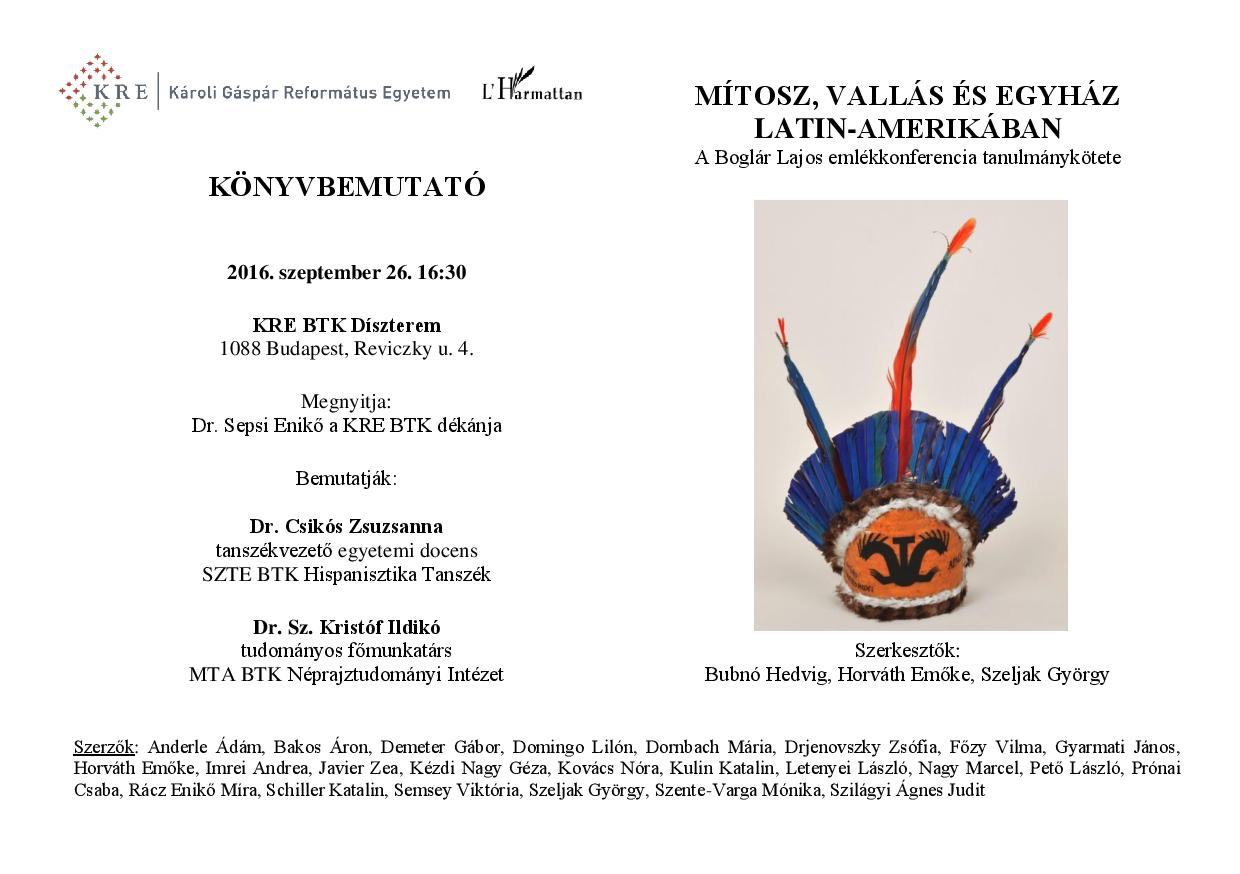 On 26 September 2016 the volume Myth, Religion and the Church in Latin America (Mítosz, vallás és egyház Latin-Amerikában. eds. Hedvig Bubnó, Emőke Horváth, György Szeljak) was launched at the assembly hall of the Károli Gáspár University of the Reformed Church in Hungary. The book was presented by Zsuzsanna Csikós and our colleague, Ildikó Sz. Kristóf.
On 26 September 2016 the volume Myth, Religion and the Church in Latin America (Mítosz, vallás és egyház Latin-Amerikában. eds. Hedvig Bubnó, Emőke Horváth, György Szeljak) was launched at the assembly hall of the Károli Gáspár University of the Reformed Church in Hungary. The book was presented by Zsuzsanna Csikós and our colleague, Ildikó Sz. Kristóf.
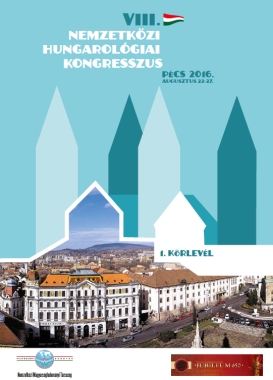 The International Association for Hungarian Studies, the University of Pécs, the Regional Committee of Pécs of the Hungarian Academy of Sciences and the CongressLine Company organised the 8th International Congress on Hungarian Studies between 22–27 August 2016 at Pécs. Our colleague, Dezső Gurka presented a paper about the Hungarian antecedents of Imre Lakatos’s philosophy of science and mathematics.
The International Association for Hungarian Studies, the University of Pécs, the Regional Committee of Pécs of the Hungarian Academy of Sciences and the CongressLine Company organised the 8th International Congress on Hungarian Studies between 22–27 August 2016 at Pécs. Our colleague, Dezső Gurka presented a paper about the Hungarian antecedents of Imre Lakatos’s philosophy of science and mathematics.
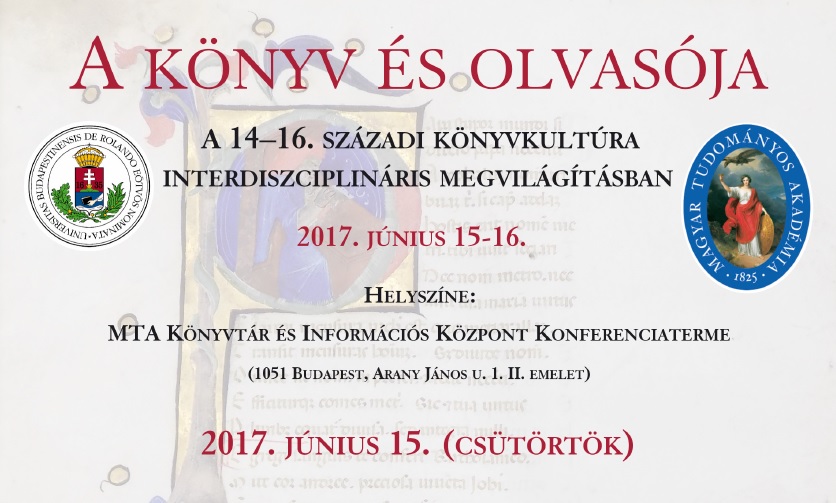 The Library and Information Centre of the Hungarian Academy of Sciences organised a conference on 15 June 2016 on the book culture of the fourteenth and sixteenth centuries. As part of the event, a new volume was launched by our colleague, Ildikó Sz. Kristóf. (Lucie Dolezalová, Farkas Gábor Kiss and Rafał Wójcik ed., The Art of Memory in Late Medieval Central Europe [Czech Lands, Hungary, Poland]. Budapest–Paris: L’Harmattan, 2016.)
The Library and Information Centre of the Hungarian Academy of Sciences organised a conference on 15 June 2016 on the book culture of the fourteenth and sixteenth centuries. As part of the event, a new volume was launched by our colleague, Ildikó Sz. Kristóf. (Lucie Dolezalová, Farkas Gábor Kiss and Rafał Wójcik ed., The Art of Memory in Late Medieval Central Europe [Czech Lands, Hungary, Poland]. Budapest–Paris: L’Harmattan, 2016.)
 On 7–9 June 2016, an international conference was held at the University of Siedlce, Poland on border-crossings in education. Dezső Gurka presented a paper on Polish history in the teaching practice of Hungarian middle and high schools.
On 7–9 June 2016, an international conference was held at the University of Siedlce, Poland on border-crossings in education. Dezső Gurka presented a paper on Polish history in the teaching practice of Hungarian middle and high schools.
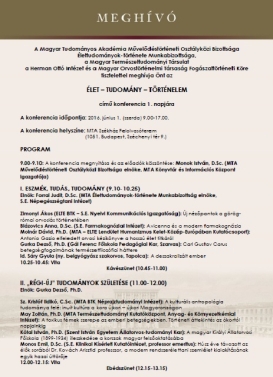 The Sub-Committee on the History of Life Sciences of the Committee on Cultural History of the Hungarian Academy of Sciences, the Hungarian Society of Natural Sciences, the Ottó Herman Institute and the Company of Dental History of the Hungarian Society for the History of Medicine organised a two-day conference on the history of life sciences. On 1 June 2016, two of our colleagues presented their papers. Dezső Gurka discussed the natural philosophical background of Carus’s concept of disease, whereas Ildikó Sz. Kristóf talked about the reception of the Inuit culture in early modern Hungary in the context of the emerging discipline of ethnology/anthropology.
The Sub-Committee on the History of Life Sciences of the Committee on Cultural History of the Hungarian Academy of Sciences, the Hungarian Society of Natural Sciences, the Ottó Herman Institute and the Company of Dental History of the Hungarian Society for the History of Medicine organised a two-day conference on the history of life sciences. On 1 June 2016, two of our colleagues presented their papers. Dezső Gurka discussed the natural philosophical background of Carus’s concept of disease, whereas Ildikó Sz. Kristóf talked about the reception of the Inuit culture in early modern Hungary in the context of the emerging discipline of ethnology/anthropology.
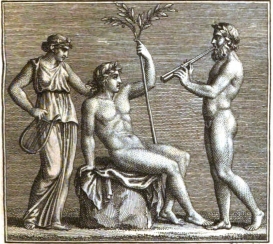 The Institute for Literary Studies of the Hungarian Academy of Sciences organised a two-day international conference on Anthropological Aesthetics in Central Europe (1750–1850) on 26–27 May 2016. Two of our colleagues discussed their findings at the conference. Piroska Balogh presented a paper about aesthetics at Hungary’s University of Pest (1774–1843), while Dezső Gurka discussed the reception of Schelling’s natural philosophy in the aesthetics of Lajos Schedius.
The Institute for Literary Studies of the Hungarian Academy of Sciences organised a two-day international conference on Anthropological Aesthetics in Central Europe (1750–1850) on 26–27 May 2016. Two of our colleagues discussed their findings at the conference. Piroska Balogh presented a paper about aesthetics at Hungary’s University of Pest (1774–1843), while Dezső Gurka discussed the reception of Schelling’s natural philosophy in the aesthetics of Lajos Schedius.
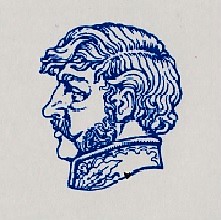 The Dániel Berzsenyi Literary and Cultural Association organised the 26th Berzsenyi Helikon Days on 6–7 May 2016 in the Helikon Castle Museum in Keszthely. At the conference, Pelso, the Hungarian Sea our colleague, György Kurucz gave a presentation on the role of the Festetics family in promoting the transfer of knowledge in Hungary at the turn of the eighteenth and nineteenth centuries.
The Dániel Berzsenyi Literary and Cultural Association organised the 26th Berzsenyi Helikon Days on 6–7 May 2016 in the Helikon Castle Museum in Keszthely. At the conference, Pelso, the Hungarian Sea our colleague, György Kurucz gave a presentation on the role of the Festetics family in promoting the transfer of knowledge in Hungary at the turn of the eighteenth and nineteenth centuries.




